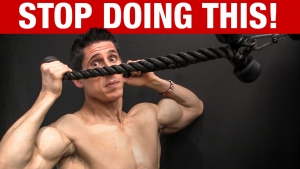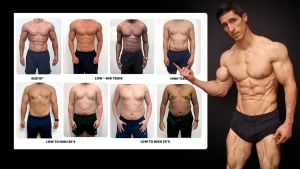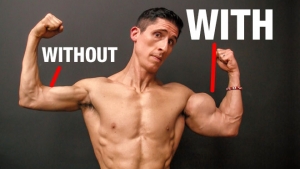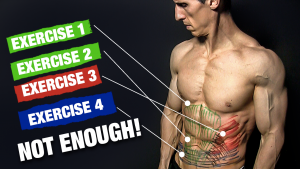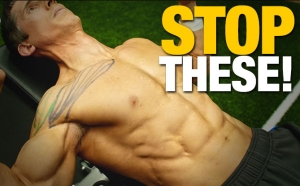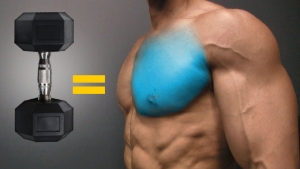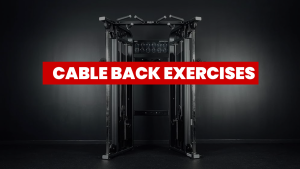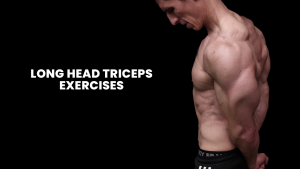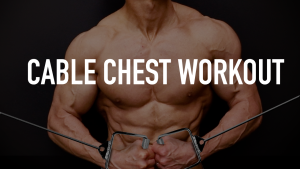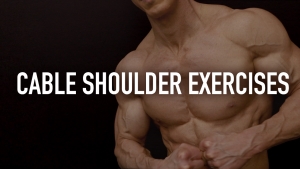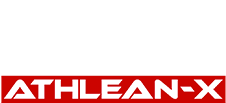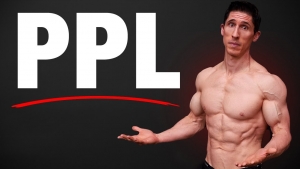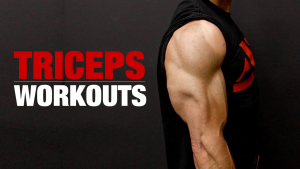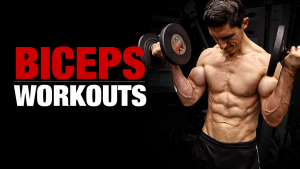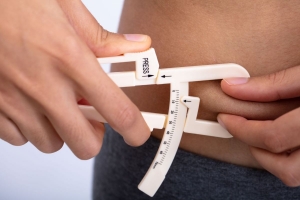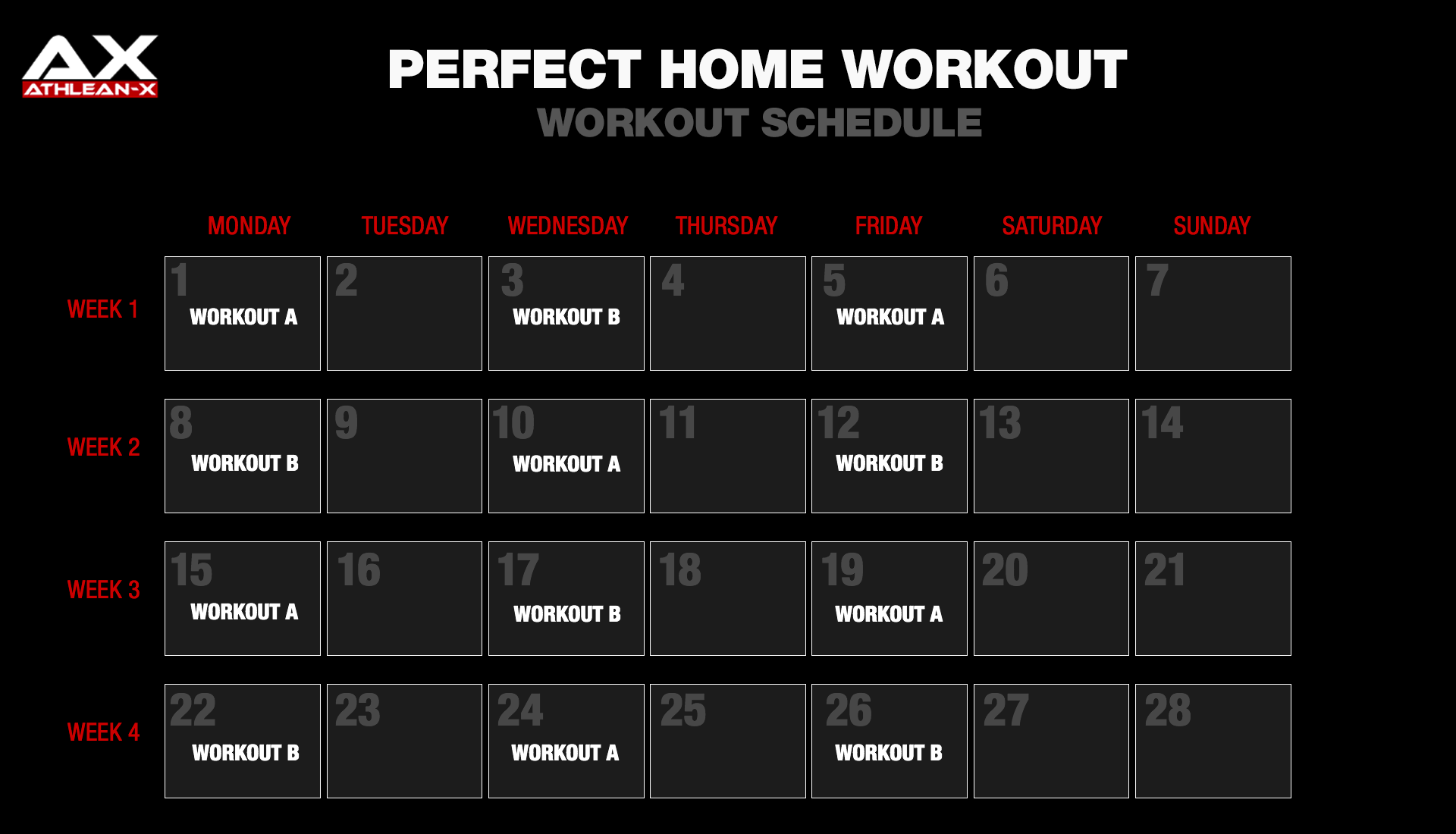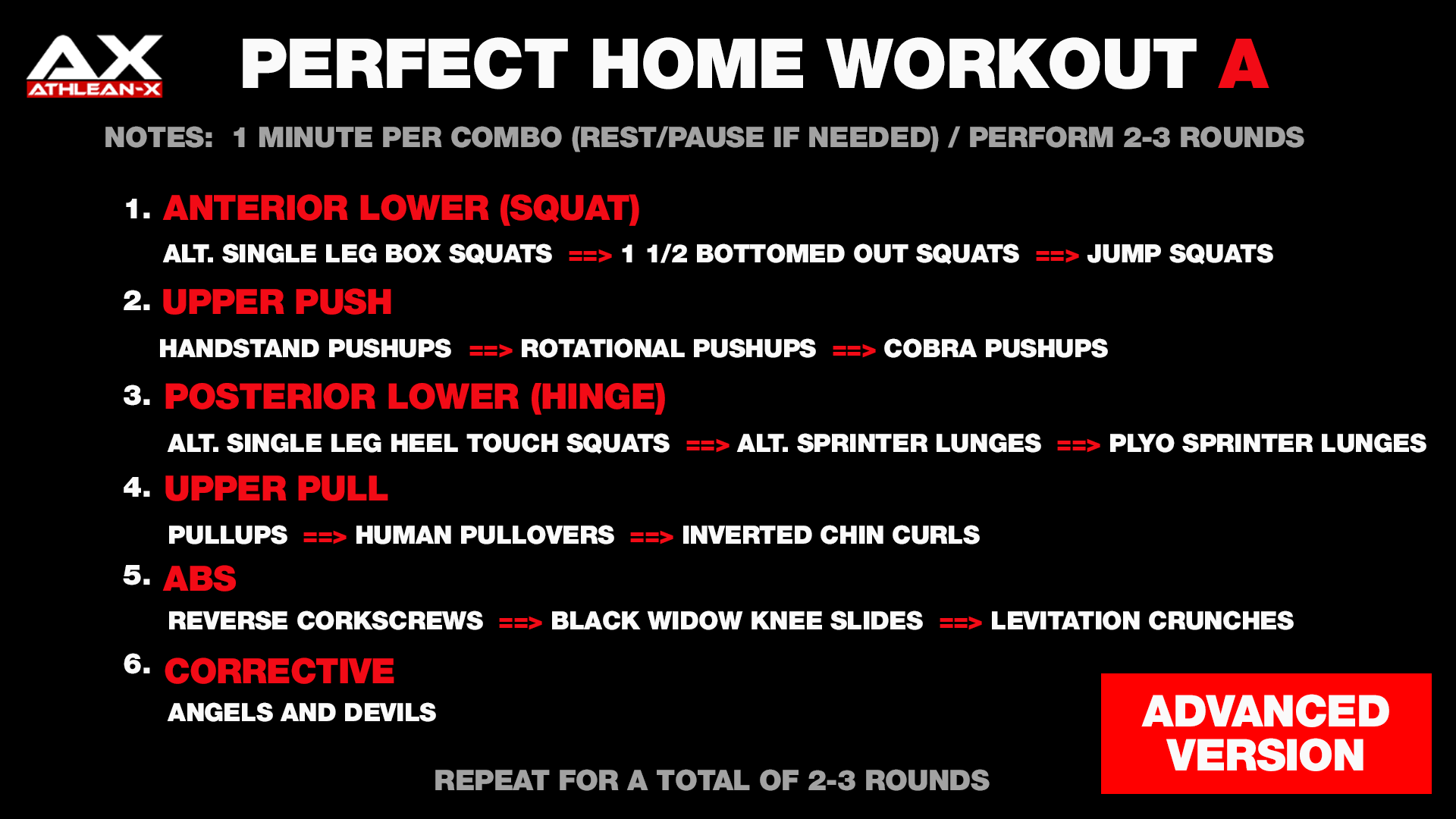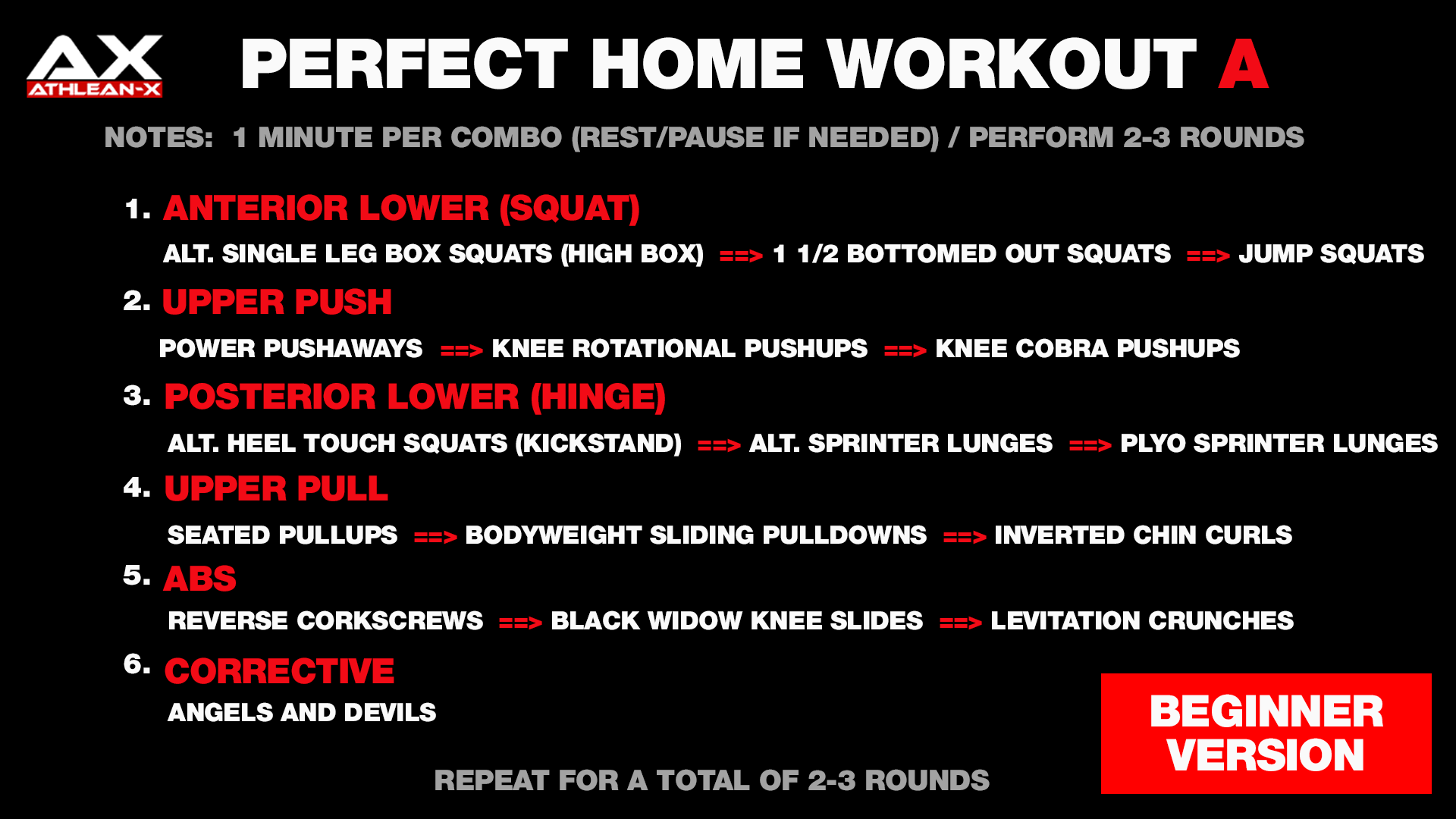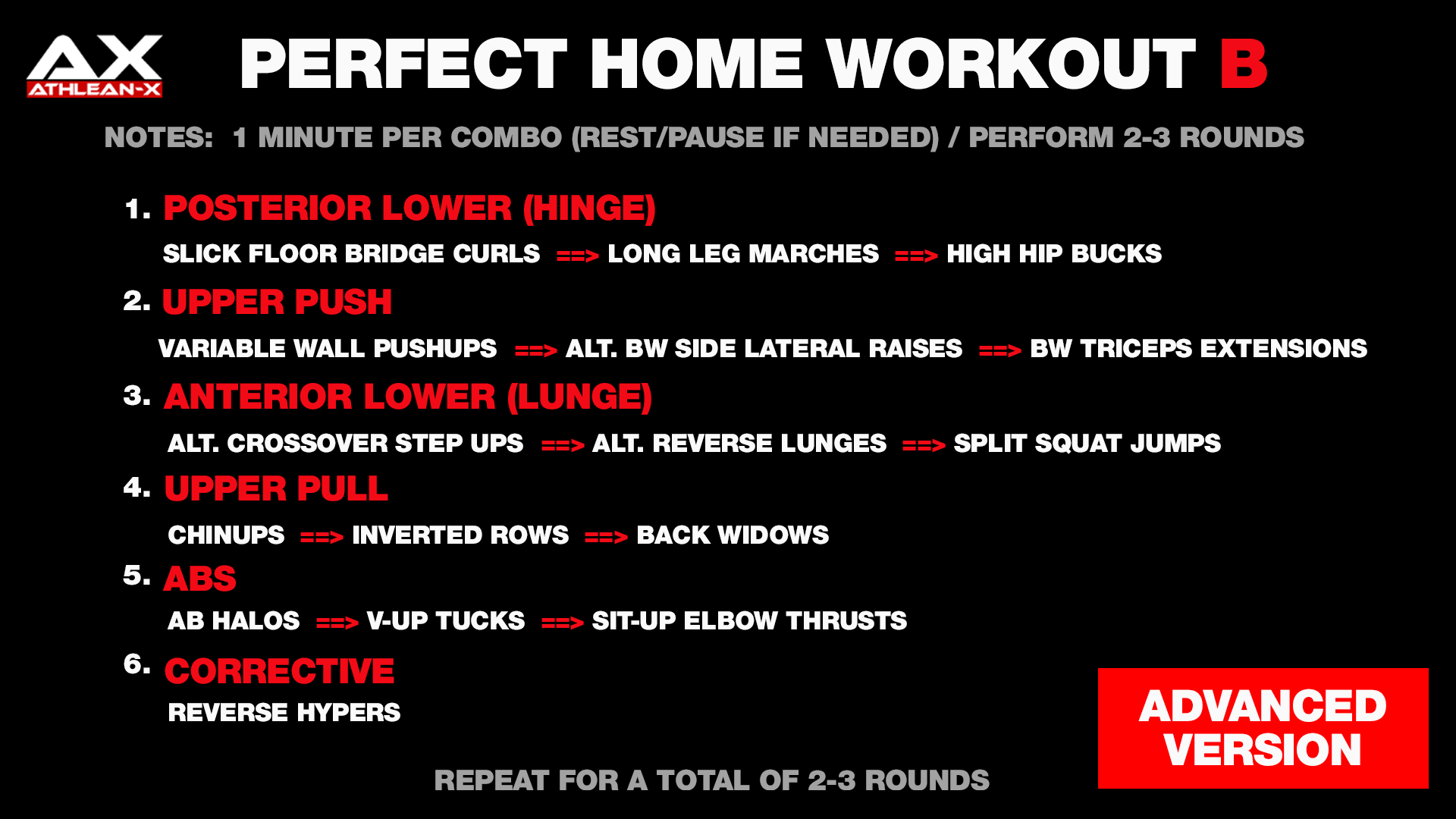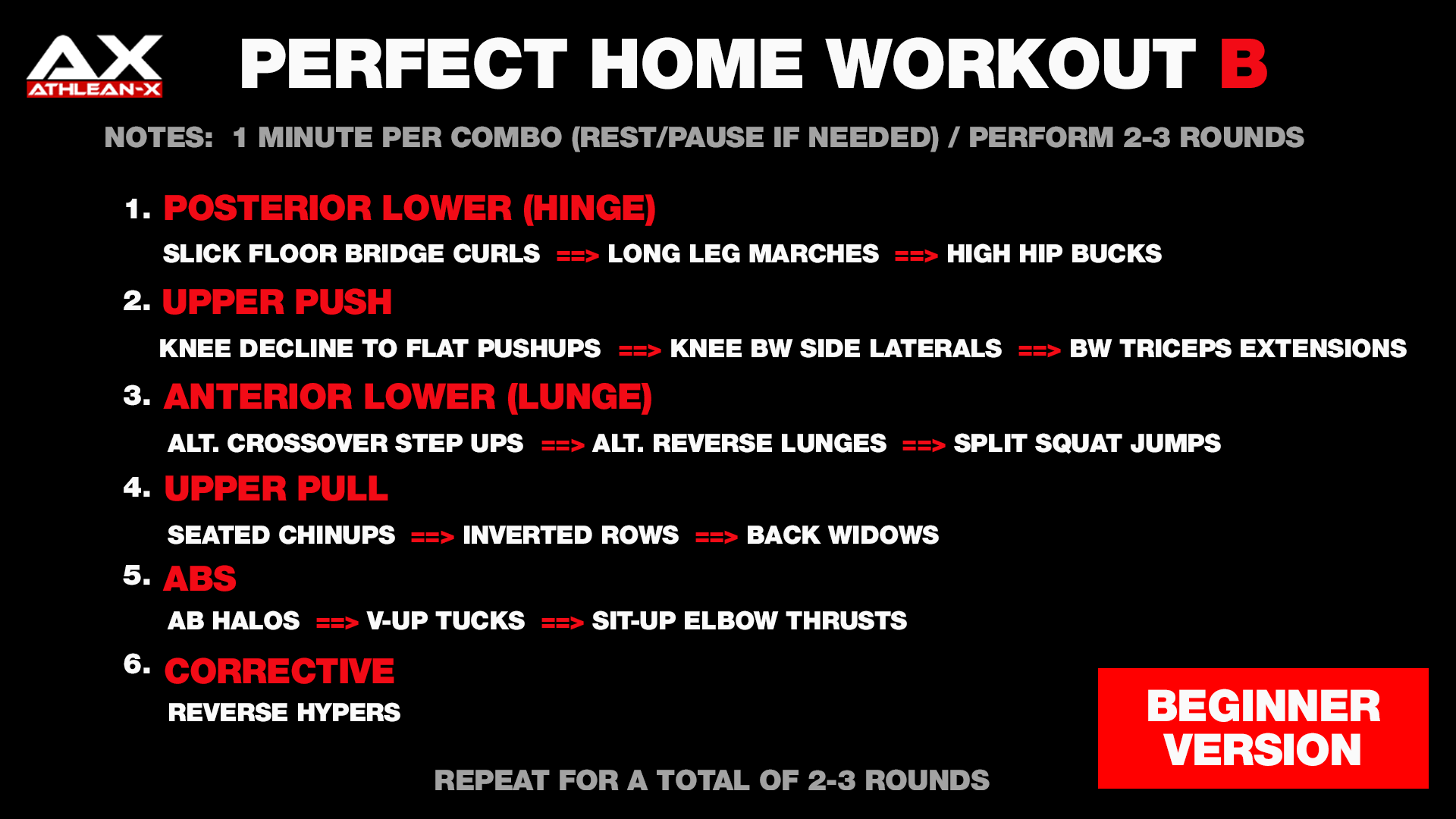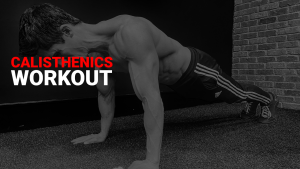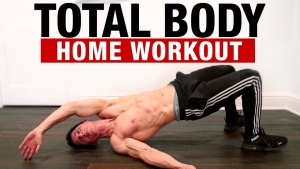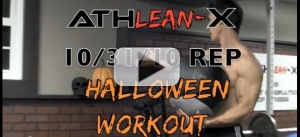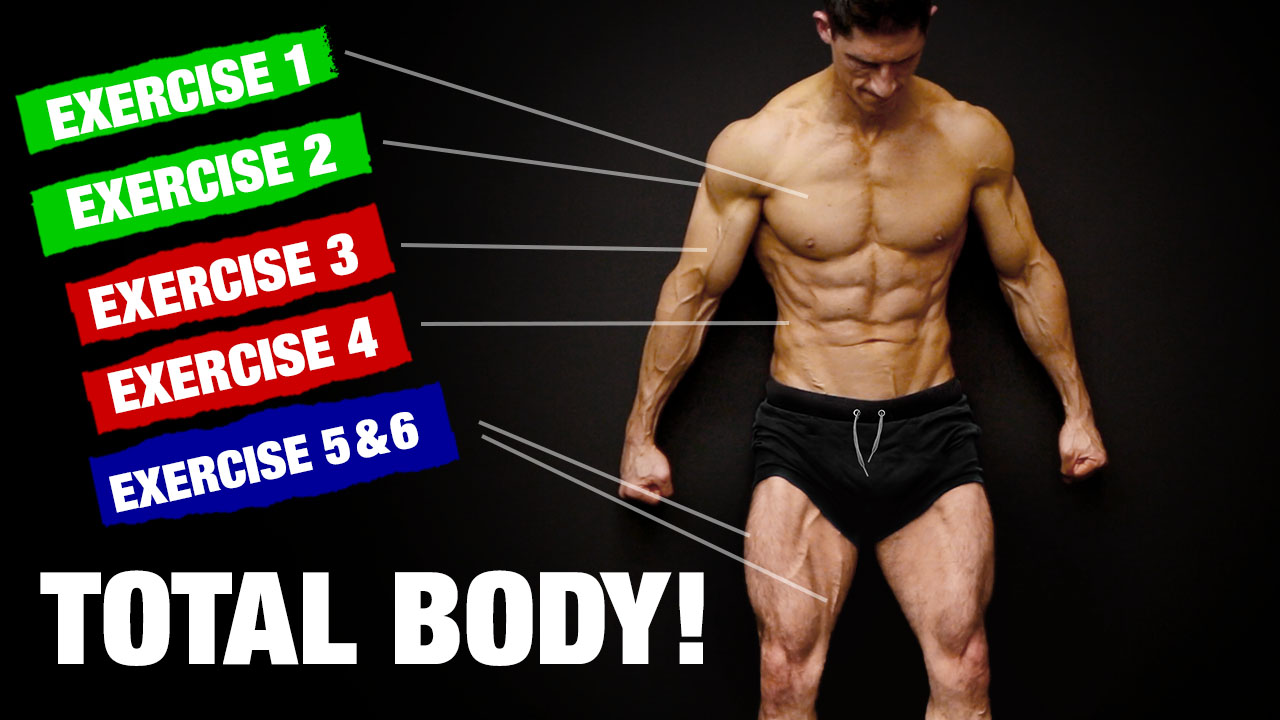
ONE MONTH TOTAL BODY HOME WORKOUT ROUTINE
If you can’t get to the gym, home bodyweight exercises and workouts can be a lifesaver.
And working out at home does NOT have to mean sacrificing your gains!
I’m going to show you a full body workout that will help you build strength regardless of whether or not you ever step foot in a gym.
This workout will help you build muscle and lose fat from the comfort of your very own living room.
Even if you have no equipment at home to work out with! You don’t even need a set of dumbbells to do this strength training routine.
But, I’ve got a surprise for you… it’s not just ONE WORKOUT.
It’s an entire home bodyweight workout plan with the best home workouts to build muscle!
I wanted to make sure no one was left out. For that reason, I’m including:
- TWO complete TOTAL BODY workouts using ZERO equipment
- Separate complete bodyweight BEGINNER and ADVANCED routines to accommodate any fitness level
- A complete 1 month bodyweight workout plan to get ripped
The key to the effectiveness of these home workouts to build muscle is that they combine exercises together in series that allow you to train to greater overload than would be possible if you stuck with just a single exercise for each purpose.
This month long home bodyweight workout routine is made up of two complete workouts that will be alternated.
Workout A will be performed on Monday and Friday of Week 1, and Workout B will be performed on Wednesday. In Week 2, you’ll perform Workout B on Monday and Friday, with Workout A slotted in for Wednesday. You’ll be alternating your workouts for a month or as long as you do the athome workout programs.
BUILDING THE best HOME WORKOUT program
Because this is a total body workout, we’re not trying to hit individual muscles with specific exercises for each.
That could lead to an excessively long bodyweight training program with the potential for overtraining, or trying to accomplish too much in just one workout.
Instead we’re going to be focusing on hitting some major functions that will help us in our goal of building muscle everywhere.
These are the 6 major functions that we’re trying to hit in each full body workout:
- Lower Body Anterior Chain
- Upper Body Upper Push
- Lower Body Posterior Chain
- Upper Body Pull
- Abdominal Circuit
- Corrective Exercise
Here are the general rules and instructions for this home workout routine:
- Not only will Workout A and Workout B contain totally different exercises, there are two complete versions of each workout to be sure that beginner level and more advanced lifters can follow this exercise program and get results from it.
- There’s NO REST period prescribed at any point during each workout, which is the reason we are staggering upper and lower. That means no rest between combinations or between individual exercises within the combinations!
- You’ll perform each exercise for a minute with the goal of NO REST. Try to challenge yourself, but if you can’t do it for the entire minute, that’s okay. You can simply rest/pause, and get back in on the action again and try to complete the remainder of the minute. As you get stronger you should be able to complete the entire minute for every single exercise!
- The exercises are staggered in such a way that it should allow you to continue to move through the workout even though you’re fatigued from prior exercises. This gives you the chance to train to a point of progressive overload.
- This is a full body bodyweight workout plan for beginners or advanced. Both beginner and advanced versions of the exercises are shown.
For both Workout A and Workout B I’ll show you a series for each of the 6 functions I mentioned. You’ll see that there’s some difference in the muscles emphasized in the two workouts. That said, let’s get your home workout plan started!
BODYWEIGHT HOME WORKOUT A
Workout A is comprised of those 6 major functions I mentioned previously, and I’ve laid it all out for you so that you don’t have to worry about having to memorize them. Just follow the exercises one after another, for a minute each.
Remember that you’ll be doing each of these exercises for one minute with no rest in between. If you can’t do them with no rest, you can rest/pause and then keep going.
LOWER BODY ANTERIOR CHAIN
Our first combination in this workout is an anterior chain squat focused lower body circuit.
We’re doing three lower body exercises, one after the other stacked together with no rest. When we train in this way, the cumulative fatigue this creates allows us to be progressive and overloaded.
If we just stopped at the first exercise, or even if we took that to failure, you could be doing it for a really long period of time. Instead, the progressive overload we’re creating with this circuit is where the real benefit comes in!
We’ll be kicking this off with a modified pistol squat. Start position is standing with your feet hip width apart. Raise your left leg off the floor out in front of you and slowly lower yourself until your butt gently touches the box, and then come right back up. Switch legs and repeat, alternating sides.
ALTERNATING SINGLE LEG LOW BOX SQUAT (Advanced)

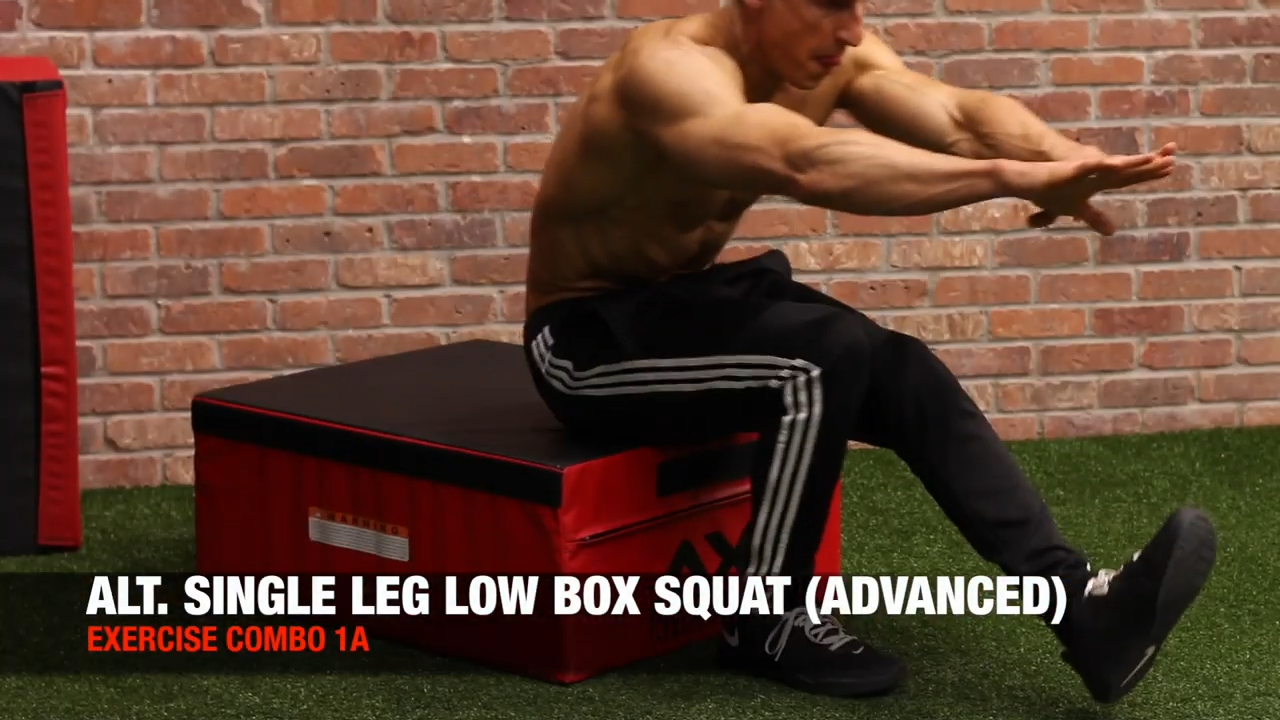
Exercise notes: If you are performing the advanced bodyweight workout circuit, you’re going to perform this single leg bodyweight squat from a lower box or a very low piece of furniture.
alternating single leg high box SQUAT (beginner)

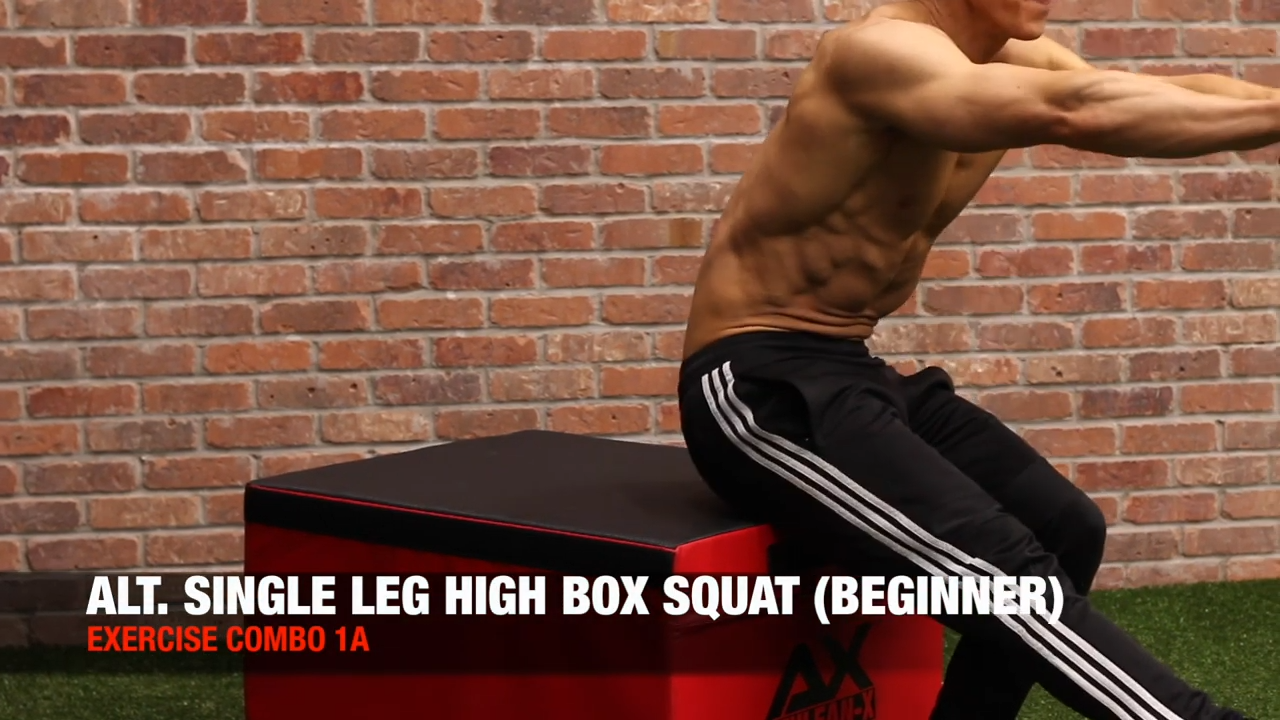
Exercise notes: If you are doing this as an intermediate or beginners bodyweight routine, you can simply raise the box. The box can be any surface that you can get yourself down to, even a bed or a couch. Sitting on the box with one leg raised out in front of you, push through the other leg into standing position, then sit back down keeping leg raised and repeat.
Our next bodyweight exercise is a bodweight squat in which your goal is to lower as much as your range of motion allows with feet flat on the floor. Stand with feet shoulder width apart and begin by bending your knees to lower your body into squat position until thighs are parallel or beyond parallel to the ground. Return to the start and repeat.
1 1/2 BOTTOMED OUT SQUATS (ALL LEVELS)

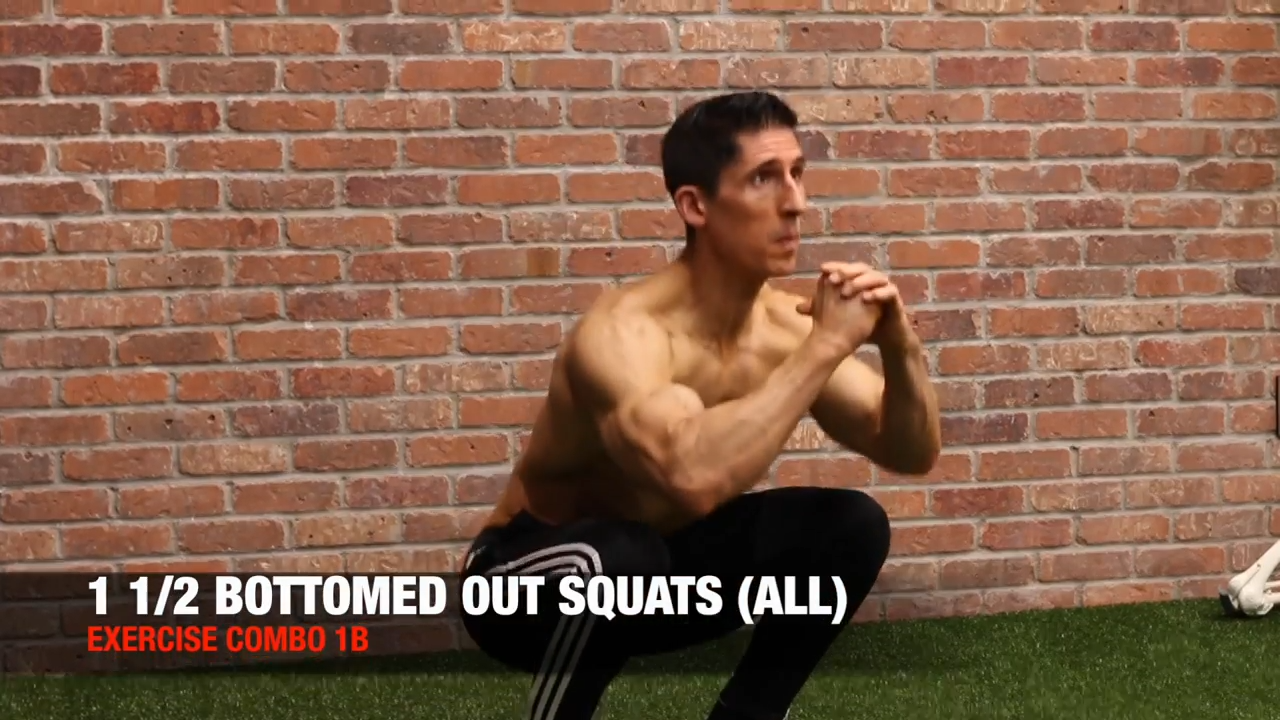
Exercise notes: This exercise helps us emphasize the parallel-to-below-parallel range of motion of the squat, which is usually the weakest area of the squat. Make sure you are squatting with proper form.
In the Jump Squat your goal is not to get beyond parallel, but just to burn out the legs at the end of our lower body circuit.
JUMP SQUAT (ALL LEVELS)

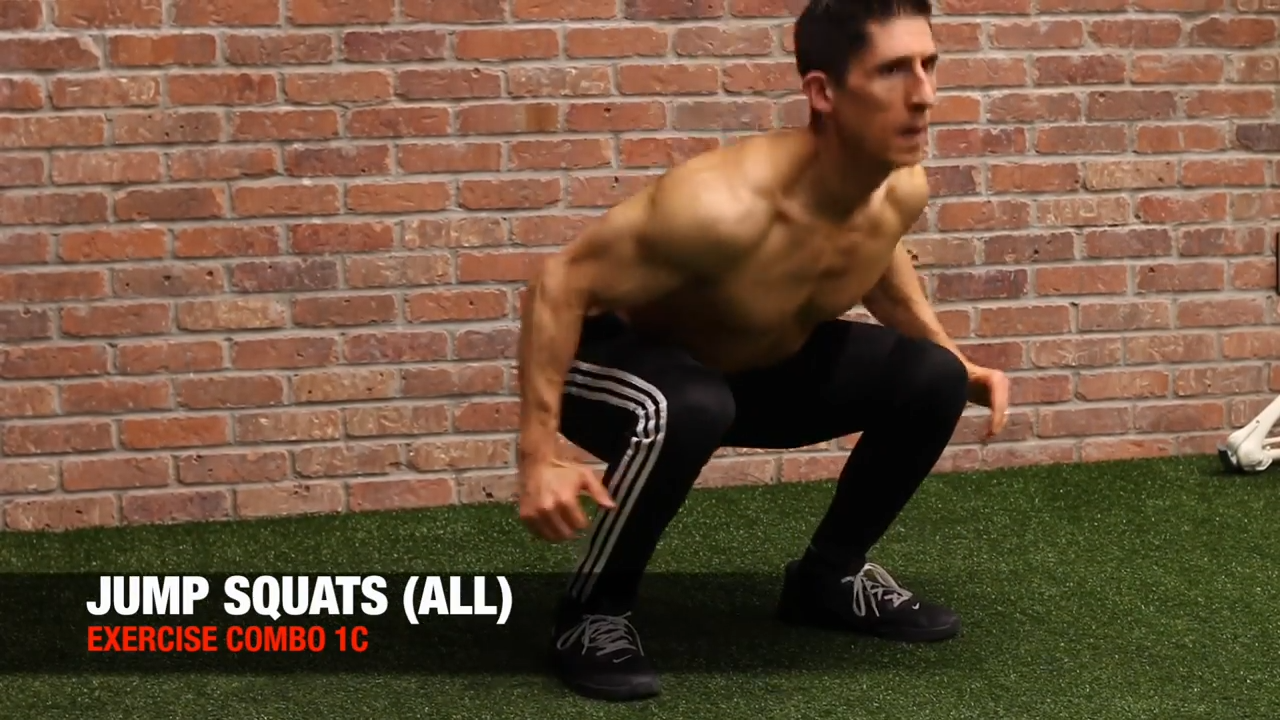
Exercise notes: Your legs are probably pretty fried by this point of your home workout, but try to maintain the jump squat for one minute, rest/pausing if you have to. This is one of the toughest leg exercises to end the circuit with. It will definitely get your heart rate up!
UPPER BODY UPPER PUSH
Without taking any rest we’re moving on to the next grouping which is upper push.
For this portion of the bodyweight training plan, I’ve provided different options for advanced and beginner for all three exercises.
For the Handstand Pushup, start on all fours next to a wall and then place your feet elevated on the wall with legs straight keeping your hands on the floor. With core engaged push your bodyweight upwards in a straight line and then lower your body again until your head is just a couple inches off the floor. Return to starting position and repeat.
HANDSTAND PUSHUP (ADVANCED)

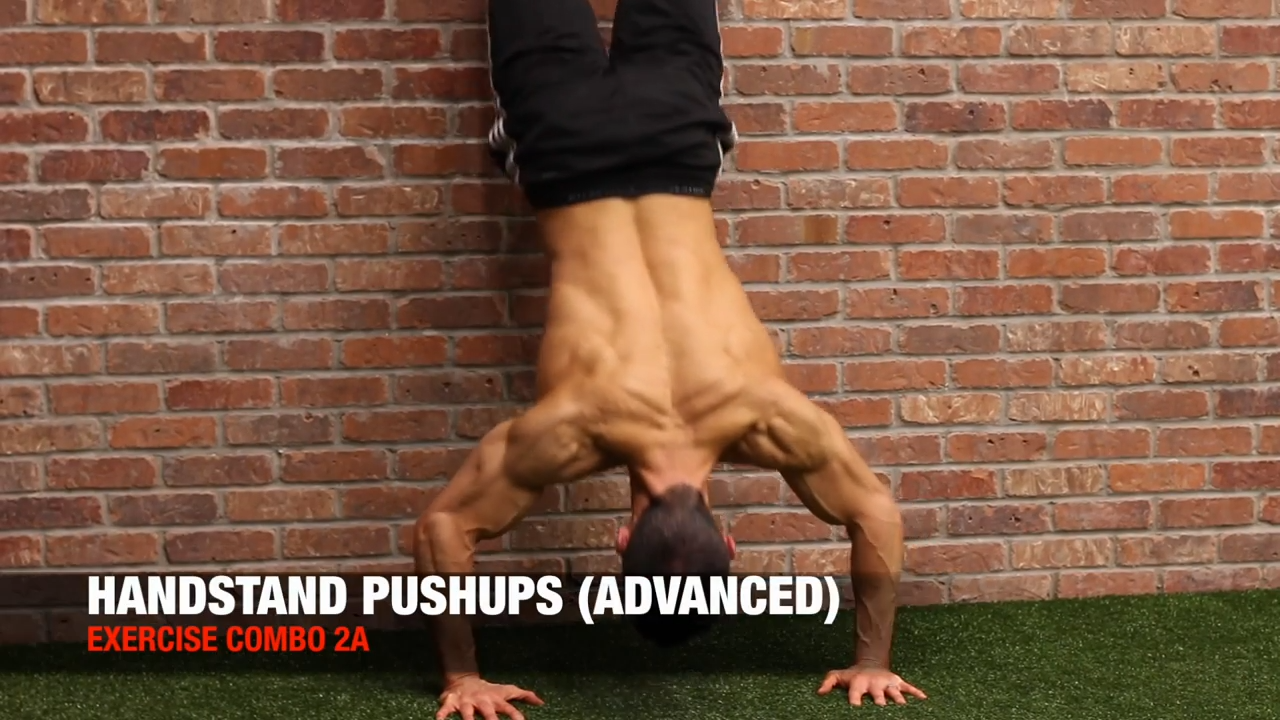
Exercise notes: This is a very challenging shoulder dominated exercise. If you’re not ready for the handstand push ups, do the Power Pushaway instead.
If you’re a doing a beginner bodyweight workout, you can do the Power Pushaway in place of Handstand Pushups. Start on all fours with knees bent and feet touching the floor, palms flat on the ground. Push your upper body diagonally back and away from your hands, ending up with arms straight.
POWER PUSHAWAY (BEGINNER)

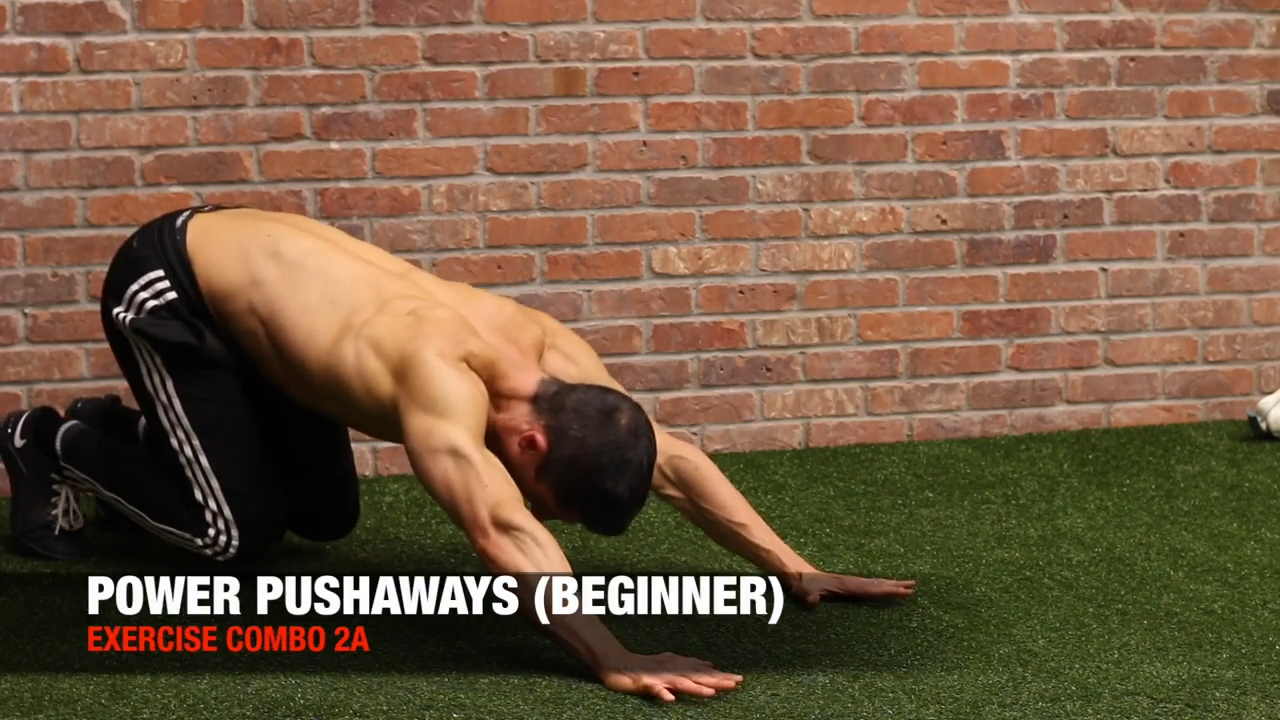
Exercise notes: This basic bodyweight exercise is still working the shoulders just like the Handstand Pushup. It doesn’t require you to lift as much of your own bodyweight off the ground, but still gets the job done. Start position is with hands about shoulder width apart. Slowly lower yourself down and forward, keeping your elbows close to the body. Push backward to starting position and repeat.
For the Rotational Pushup start out in plank position with arms straight and feet shoulder width apart, body parallel to the floor. With core tight, lower yourself into pushup position. As you come back up, rotate the body towards the left side, lifting the hand of the left arm slightly up to allow for the rotation. Repeat, alternating sides.
ROTATIONAL PUSHUP (ADVANCED)

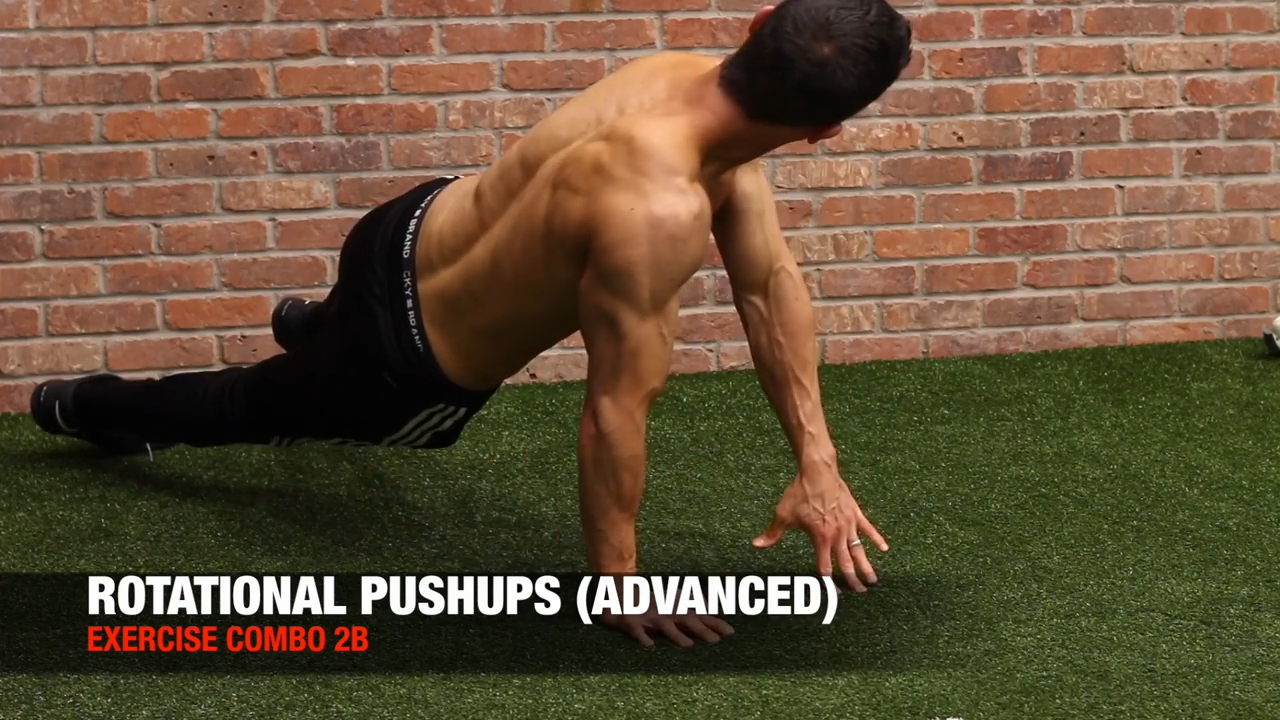
Exercise notes: The Rotational Pushup is more of a chest biased exercise. With the rotation, you get a little added abduction of the chest, which is a benefit when we’re limiting the number of exercises we’re trying to do so we can cover the entire body.
KNEE ROTATIONAL PUSHUP (BEGINNER)

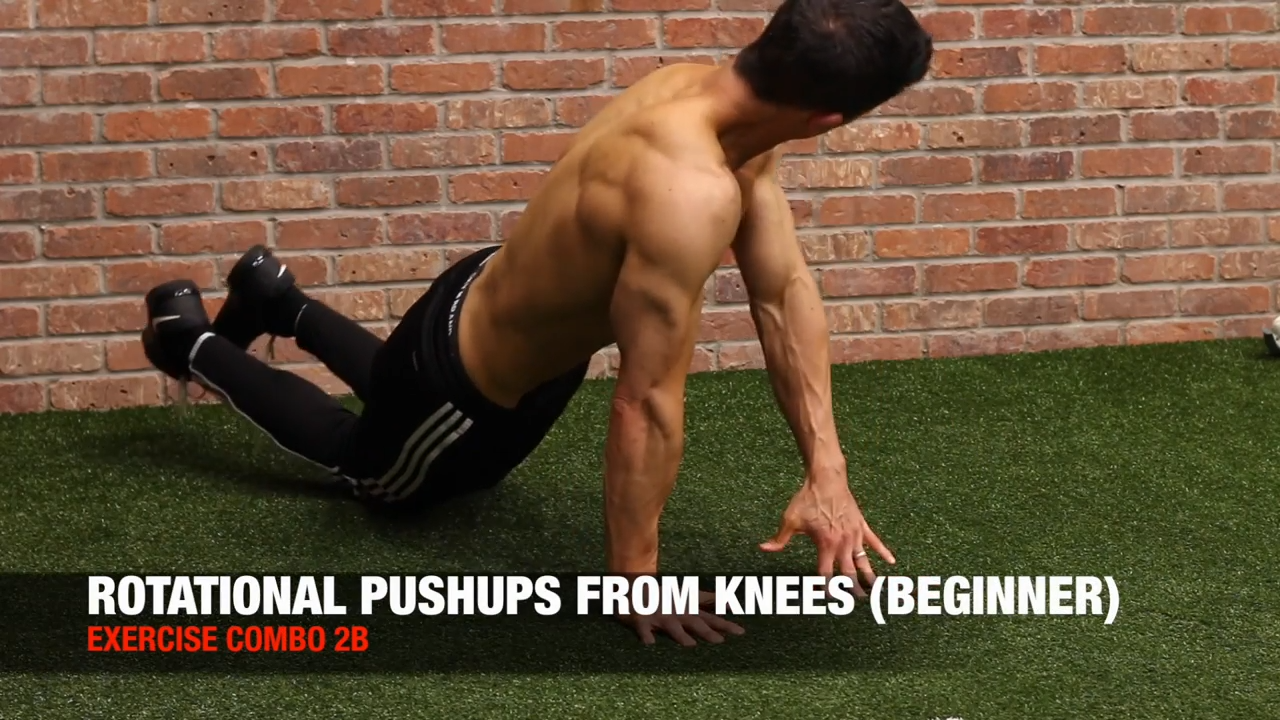
Exercise notes: If you can’t do the Rotational Pushup, simply drop down to your knees and perform the same movement. You’ll get the same benefits at a slightly easier level.
This next exercise targets the triceps. Start in high plank position raising your hips, and lower them as you pull your chest down between your elbows and push up toward cobra position.
COBRA PUSHUP (ADVANCED)

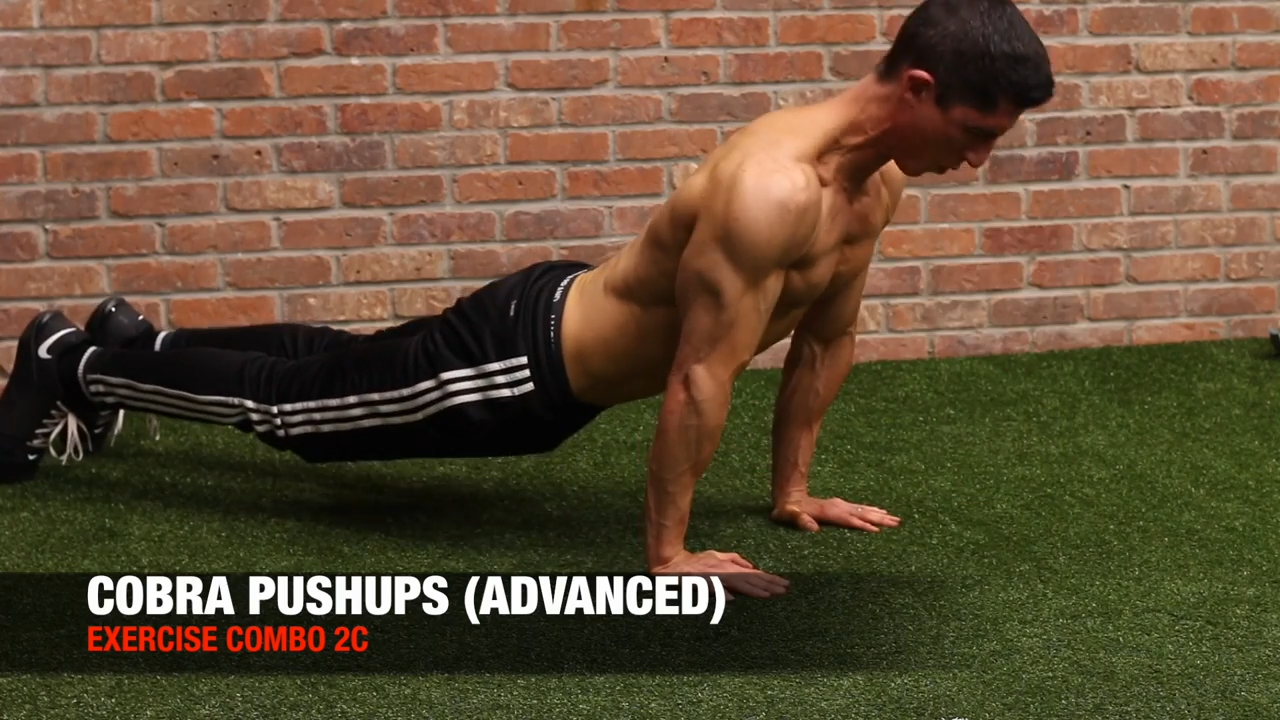
Exercise notes: This trains the long head of the triceps in its more contracted position, because your elbow is straightened with your arm held close to your body or in close to extension behind your body. Starting position is with the body in an elevated plank position. Then bring the torso down and ‘through’ the arms, arching the back and bringing the chest forward.
KNEE COBRA PUSHUP (BEGINNER)

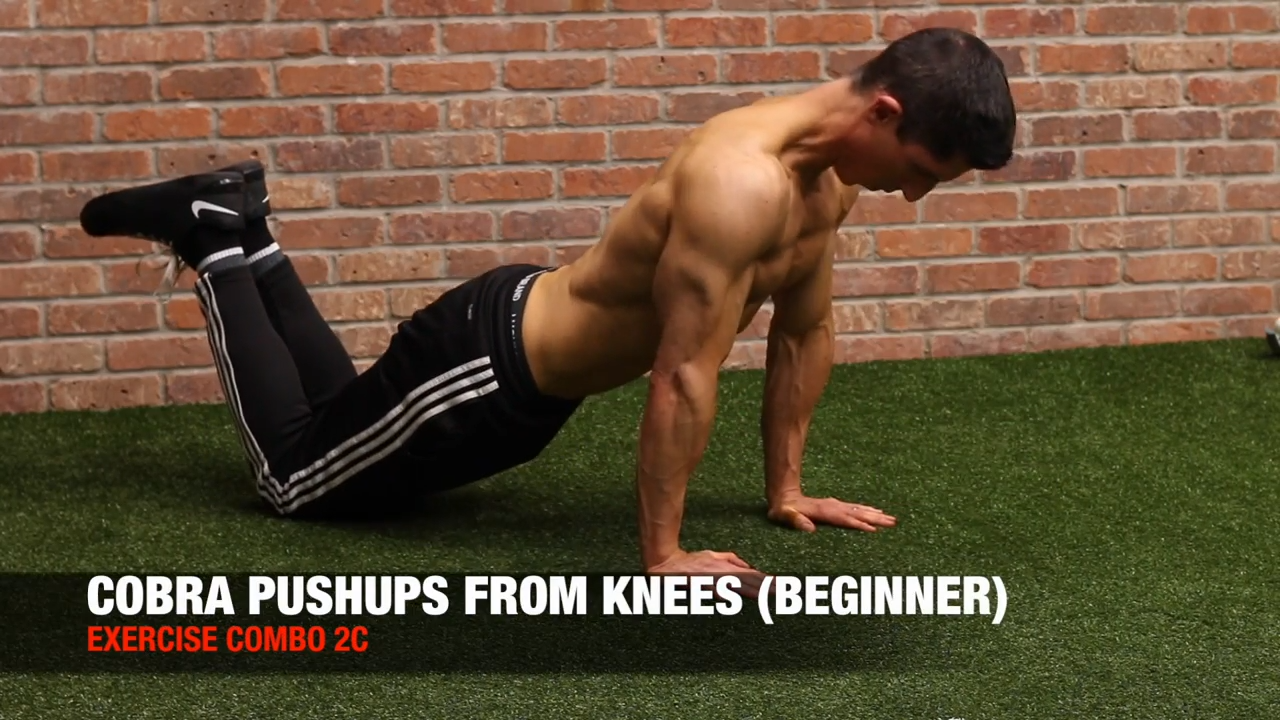
Exercise notes: This can be done from your knees if you’re a beginner and you’ll get the same benefits.
LOWER BODY POSTERIOR CHAIN
We’ll proceed directly to posterior chain focused exercises for the lower body portion of this body weight workout.
For these exercises, we will make some slight changes to the positioning to shift the focus away from quad dominance and more toward glute dominance.
The alternating touch squat is similar to a Bulgarian Split Squat but without supporting the back leg on a bench. Start with left knee bent and leg extending behind you and left foot hovering off the ground. Come straight down into a one legged squat and touch your two hands on opposite side of the heel, and then raise back up. Switch legs and repeat.
ALTERNATING SINGLE LEG HEEL TOUCH SQUAT (ADVANCED)

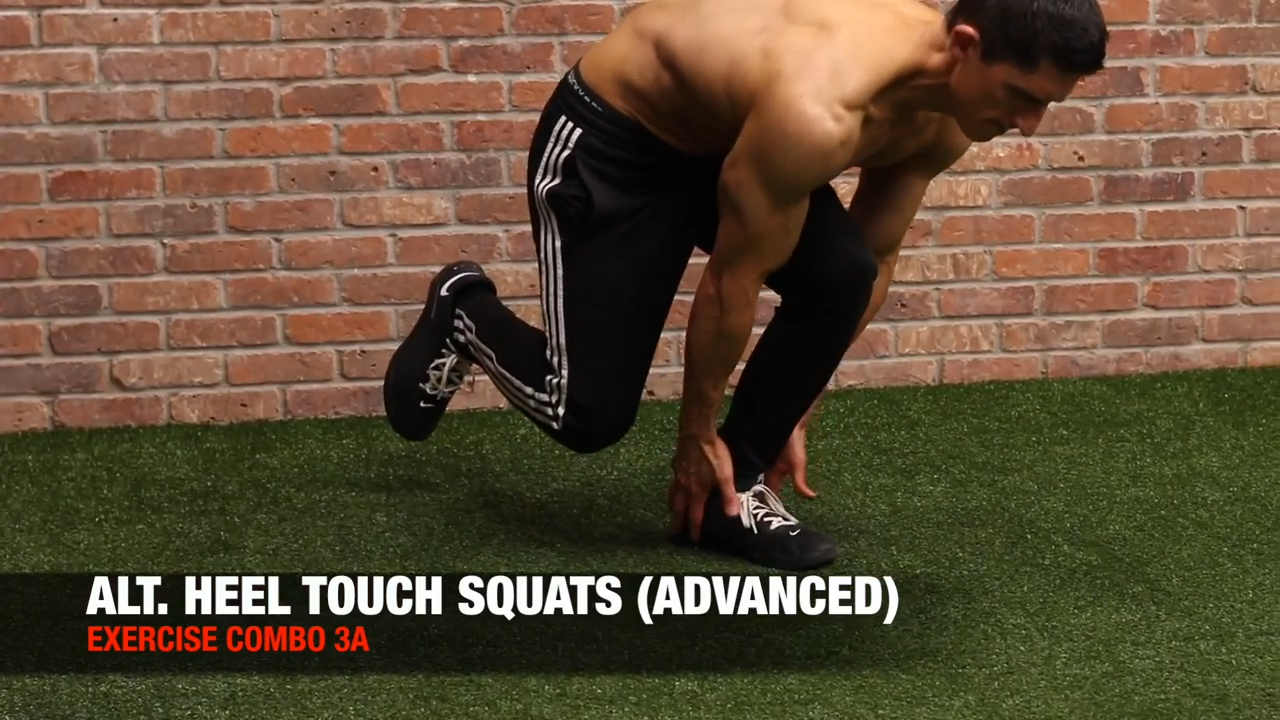
Exercise notes: Just by leaning forward you’ll shift a lot of the focus onto the glutes. You’re trying to just go down, touch both hands to the outsides of your heels and come back up.
ALTERNATING KICKSTAND HEEL TOUCH SQUAT (BEGINNER)

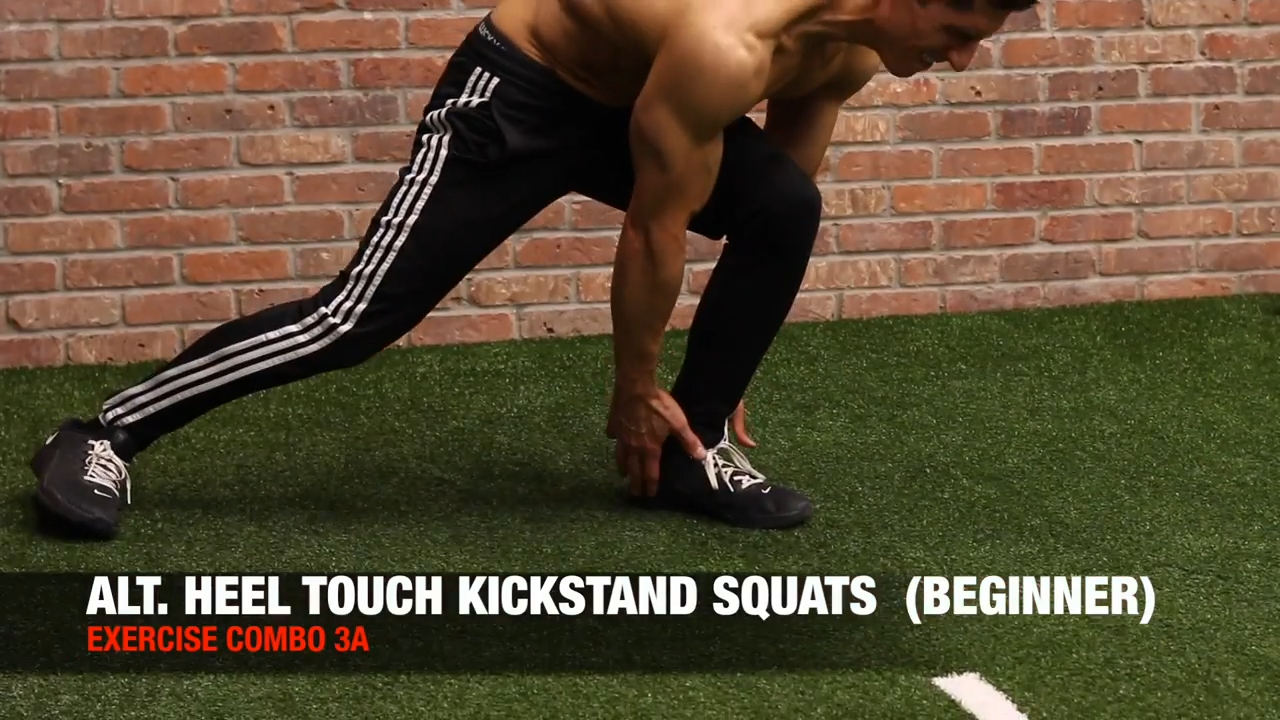
Exercise notes: If you’re a beginner and need a little bit of extra assistance or help with balance, you can do this kickstand variation in which one foot bears 10-15% of your body weight.
For the Alternating Sprinter Lunge, instead of doing forward lunges with legs forward, we’re going to alternate low lunges backward.
ALTERNATING SPRINTER LUNGE (ALL LEVELS)

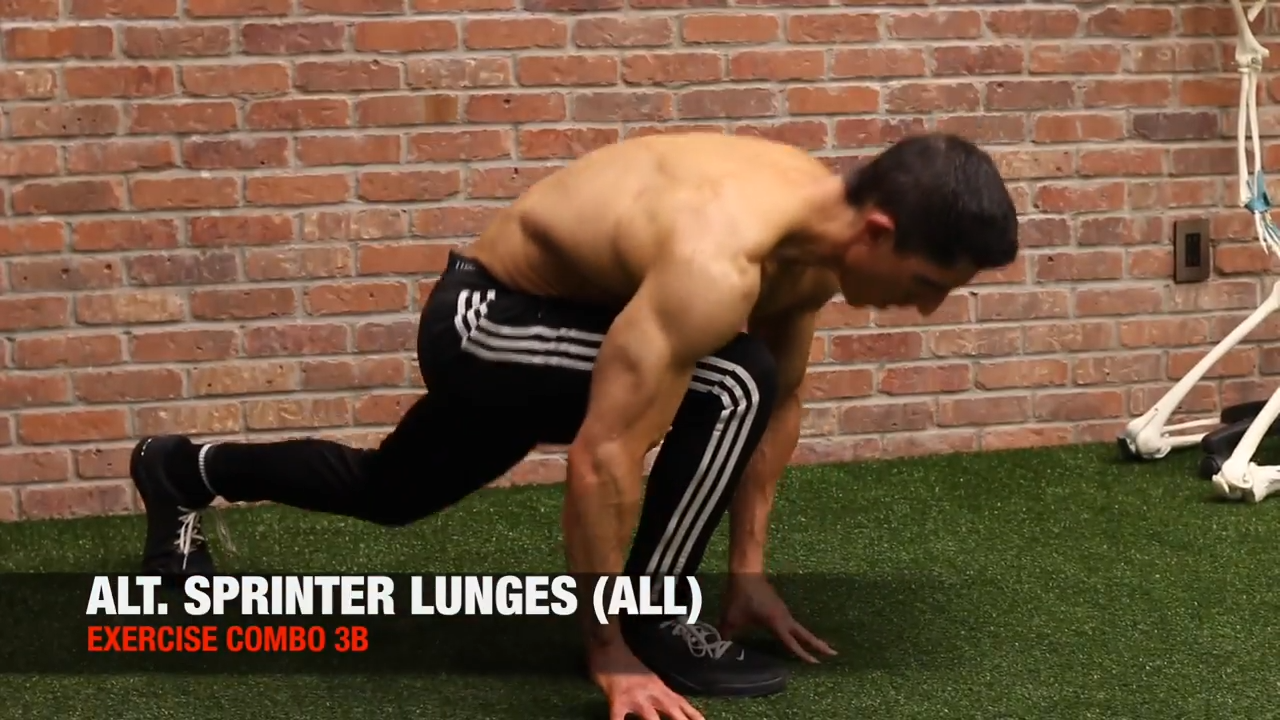
Exercise notes: By leaning forward in lunge position we turn a regular quad dominant lunge into an exercise that is more posterior chain glute dominant. Alternate legs on this exercise.
Next, we’ll make the sprinter lunges metabolic and plyometric to help you work the legs and reap the conditioning benefits as well.
LOW PLYO SPRINTER LUNGE (ADVANCED)

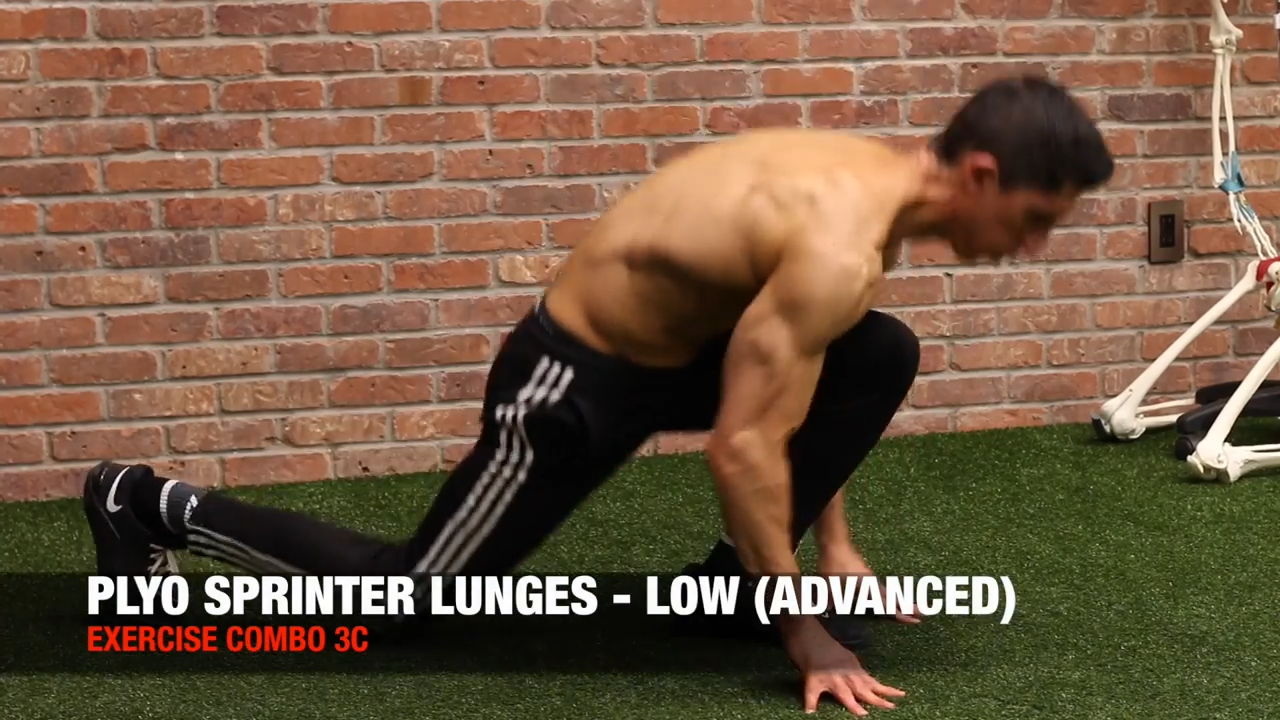
Exercise notes: Taking the same position as the previous exercise, now we really want to get more explosive in these split squats and burn it out. Stay low to the ground so that your glutes are maximally engaged.
HIGH PLYO SPRINTER LUNGE (BEGINNER)

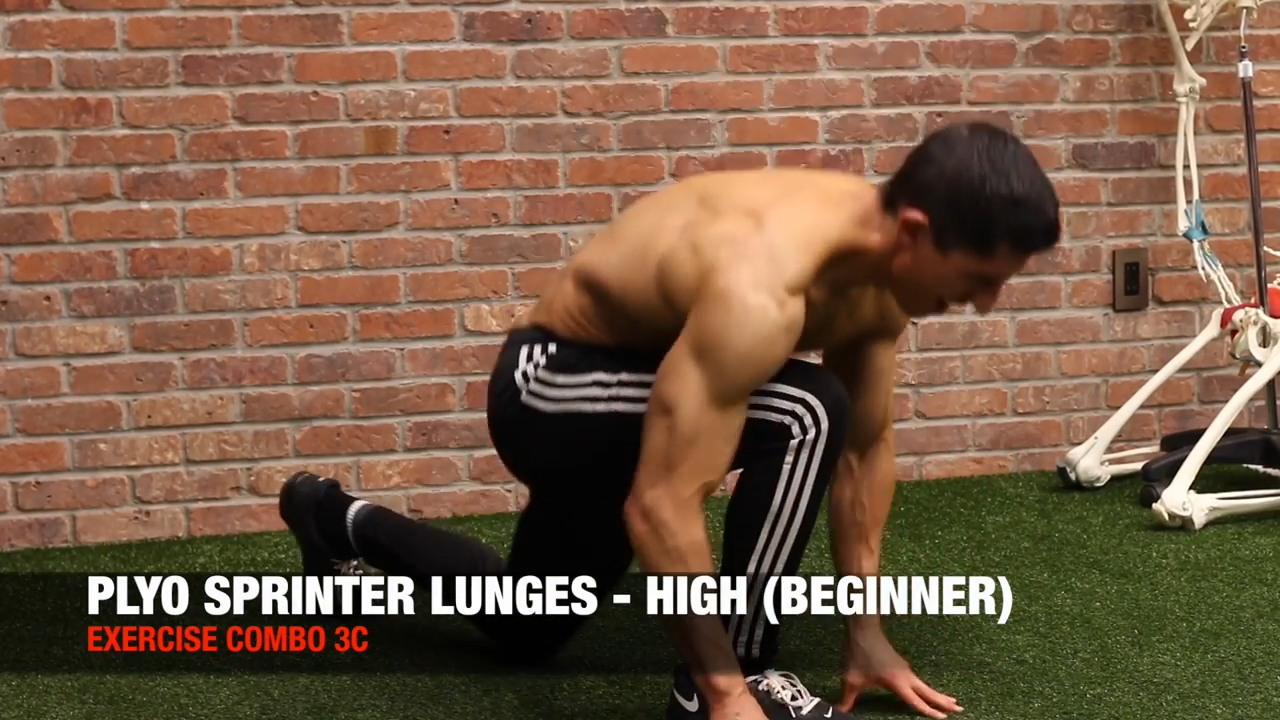
Exercise notes: If you’re a beginner, you can switch to a higher elevation up out of the lunge if needed.
UPPER BODY UPPER PULL
Taking no rest, we’ll begin the upper body pull series of this full bodyweight workout program.
You’ll see that you do need some equipment for some of these bodyweight exercises, but I’ve included modifications for household objects.
If you don’t have a pullup bar at home to perform the pullup, you can opt for a broomstick or dowel across a couple of chairs or other furniture. Whatever you choose, make sure to keep palms facing away from you. This is a home workout, so I wanted to be sure you’re left with zero excuses!
PULLUP (ADVANCED)

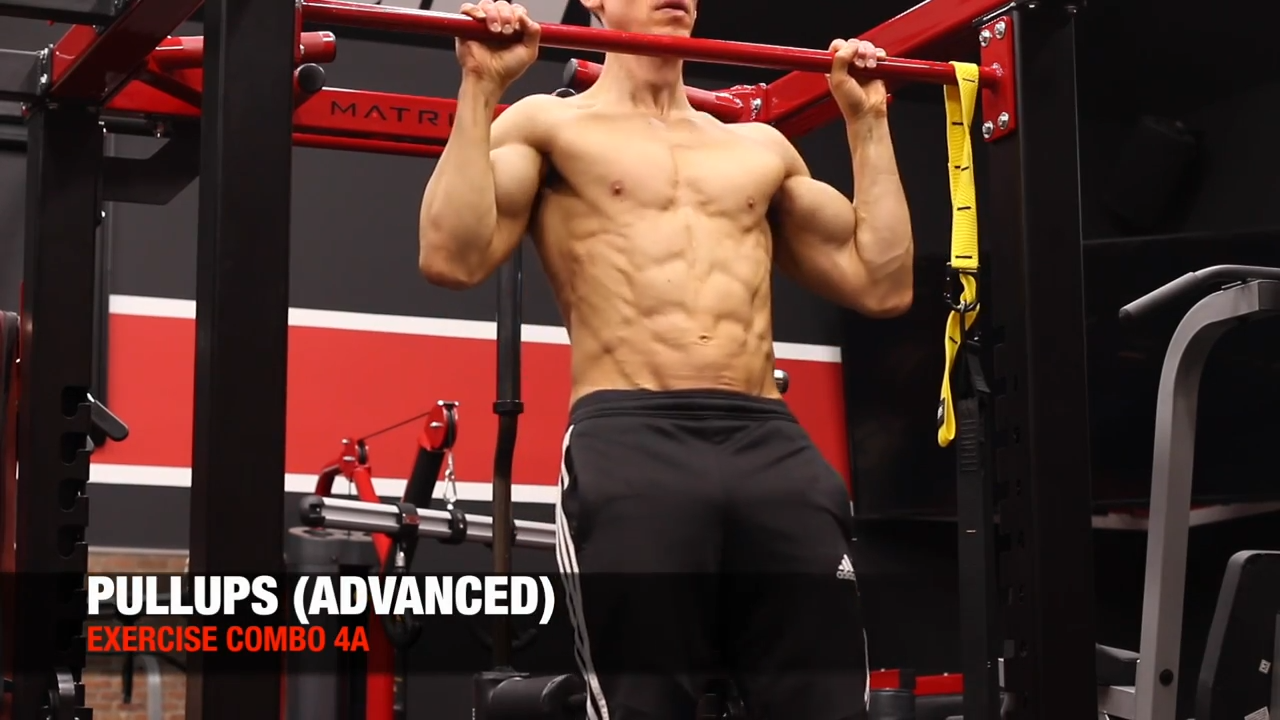
Exercise notes: The Pullup is the most classic pull exercise. You will need a pullup bar at home for this, but if the pull ups are too advanced for you or you don’t have access to the bar, try the Seated Pullup.
To perform the beginner version of the pullup, lie face up below a broomstick placed across two pieces of furniture. Keep knees slightly bent and feet on the floor as you pull yourself up and lift your hips off the floor. Then lower yourself back down and repeat.
SEATED PULLUP (BEGINNER)

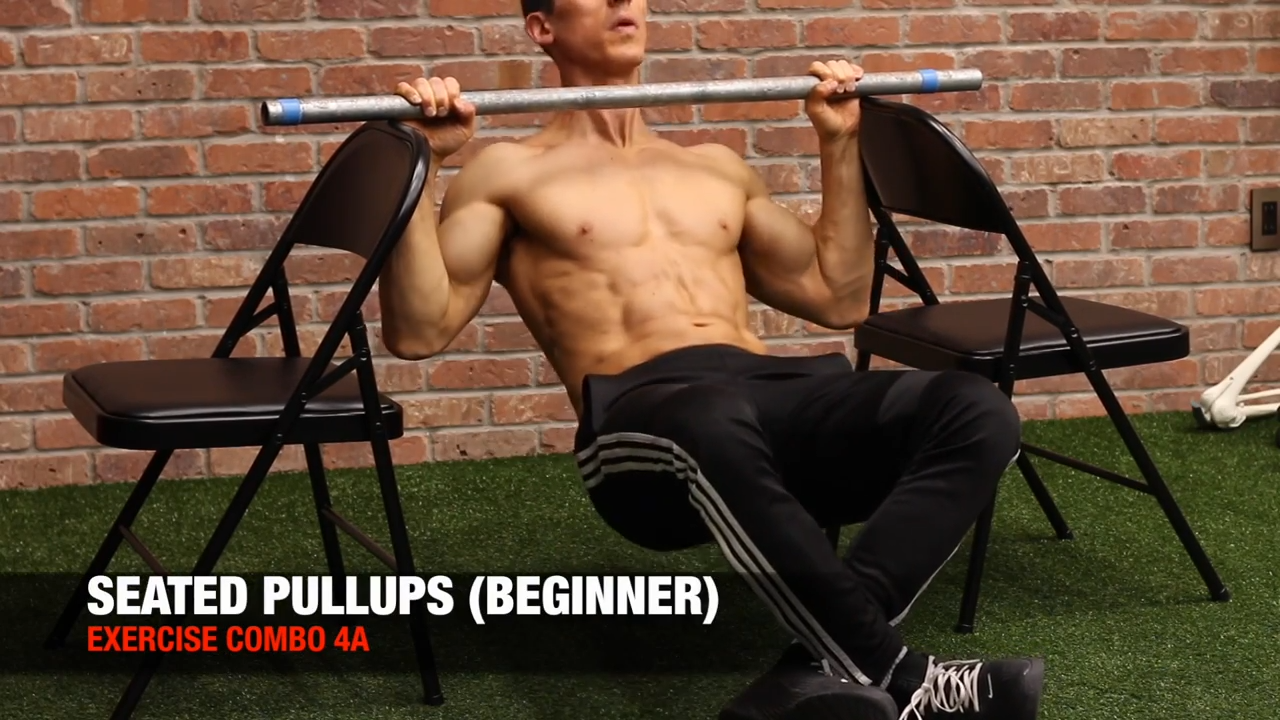
Exercise notes: Place a dowel or broomstick across the top of two couches or two chairs, position your legs as you see me doing in the image and lean back, palms facing away from you on the broomstick.
For the Human Pullover, lie face up on the ground with your hands behind your head holding on to a secure piece of furniture or object. Using the strength of the core, perform a leg lift by lifting feet off the ground, lift your hips off the ground and curl in toward your torso.
HUMAN PULLOVER (ADVANCED)

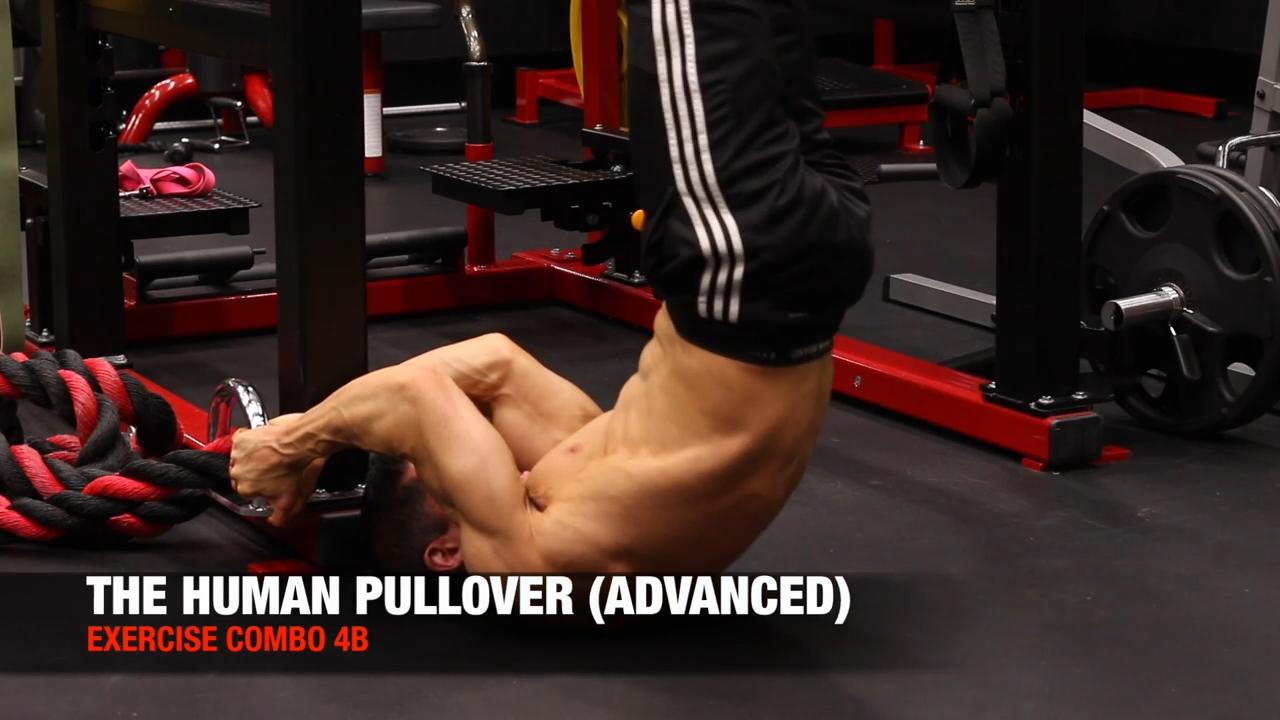
Exercise notes: The lats are doing the work here. Try to pull your body up, not by moving your knees toward your chest but by pulling the arms into an immovable object. Try to pull your arms down as hard as you can to get your body to rise.
For this exercise, start on all fours with your knees on a towel on top of a slick floor surface, feet lifted off the ground. Bring your knees toward your arms and then slide your knees back out to starting position.
BODYWEIGHT SLIDING PULLDOWN (BEGINNER)

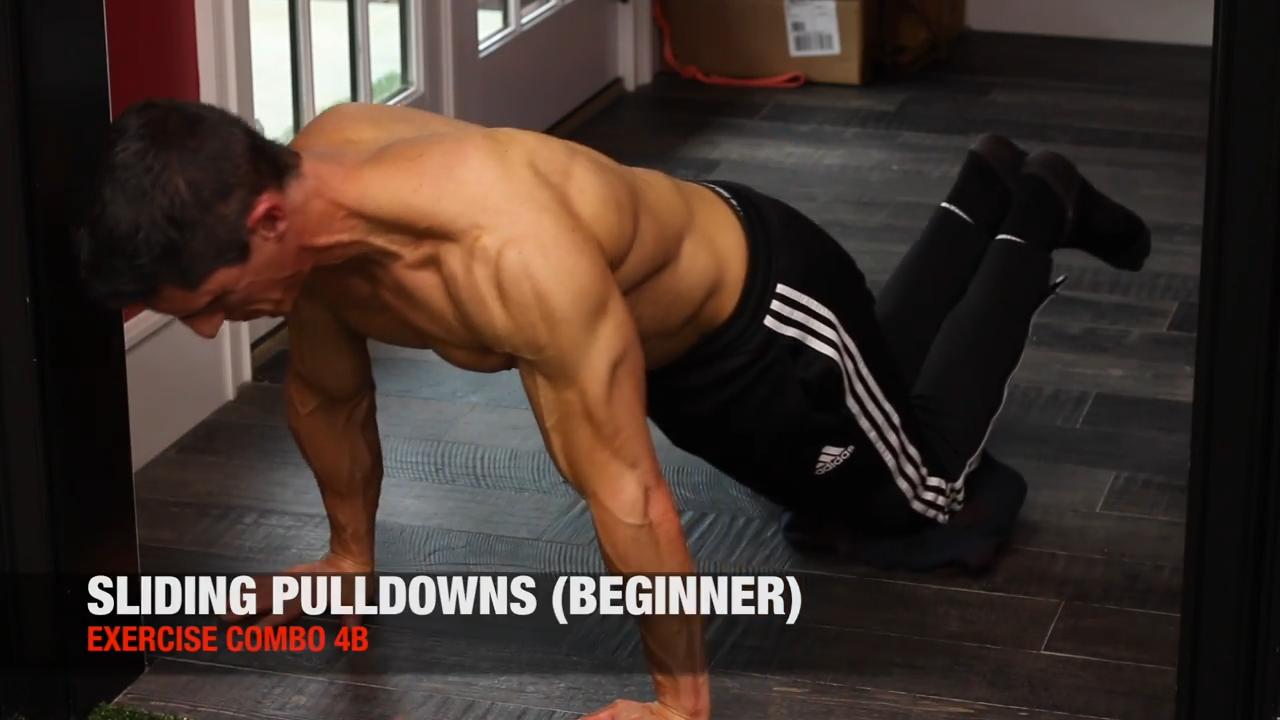
Exercise notes: Use a slick surface you can slide on like a hardwood or a tile floor. Allow your feet to drift out, get that stretch in the lats and pull back in.
For the Inverted Chin Curl, position yourself below a dowel supported by two chairs and grab the dowel with palms facing toward you and feet flat on the floor. Pull your forehead up toward the bar until your arms are at 90 degree angles and then lower yourself back down.
INVERTED CHIN CURL (ALL LEVELS)

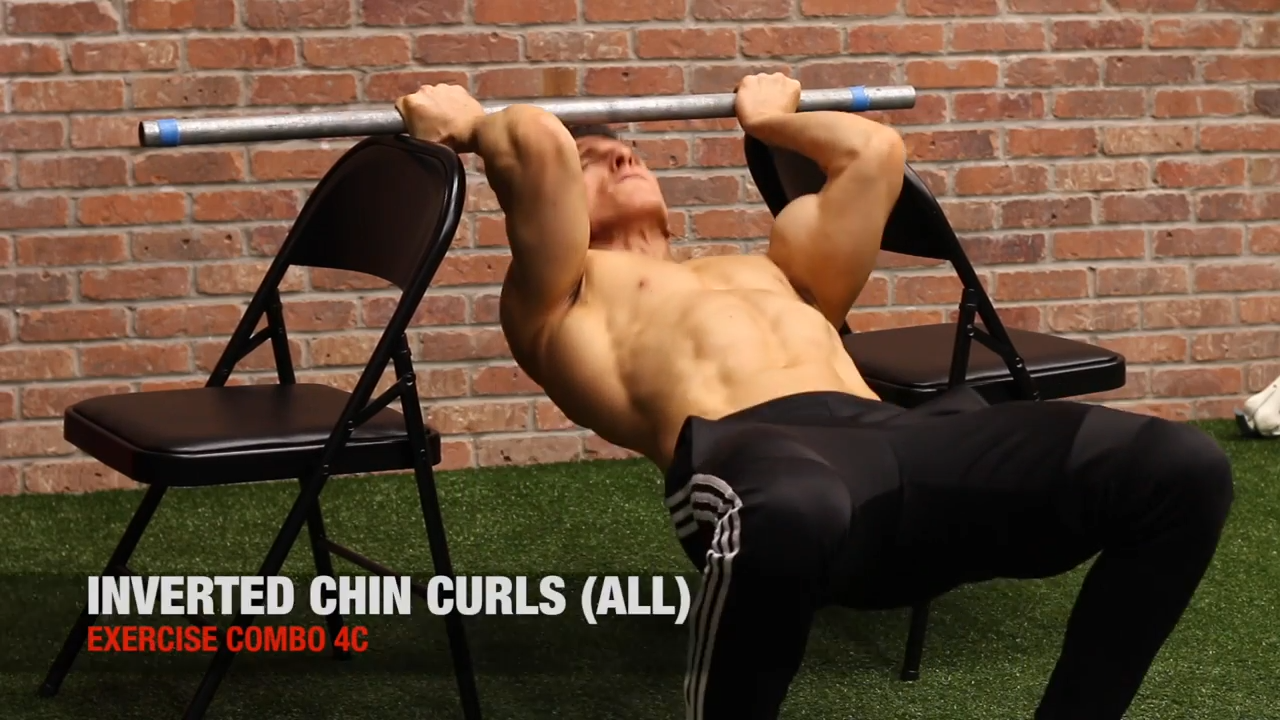
Exercise notes: The idea is not to just pull with your back, but try to pull as if you’re curling your body up to the bar to engage the biceps.
CORE CIRCUIT
In this portion of the ultimate bodyweight workout, we’ll hit all the important areas of the abs with just three core exercises.
We’ll start with a lower abs exercise that also incorporates the obliques, followed by a midrange exercise that engages both lower and upper abs, and ending with an exercise that hits the upper abs more directly.
The Reverse Corkscrew is basically a reverse crunch with a bit of a twist toward on side, alternating sides on each rep.
REVERSE CORKSCREW (ALL LEVELS)

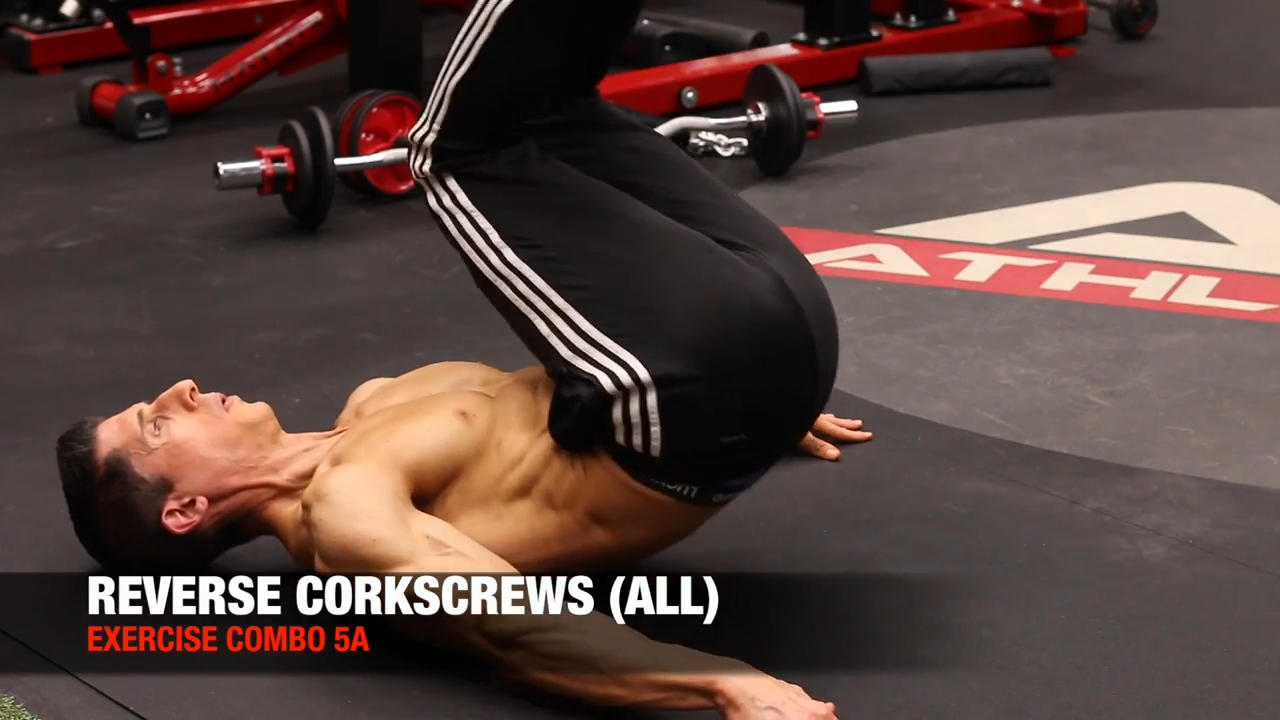
Exercise notes: You can see that we’re not only engaging the lower abdominal muscles, but we’re also getting a bit of bottom up rotation to hit the obliques as well.
For this next exercise, start out in mountain climber position, and bring the right knee toward the right elbow, slide it up the elbow, back down and then return to start. Alternate sides.
BLACK WIDOW KNEE SLIDE (ALL LEVELS)

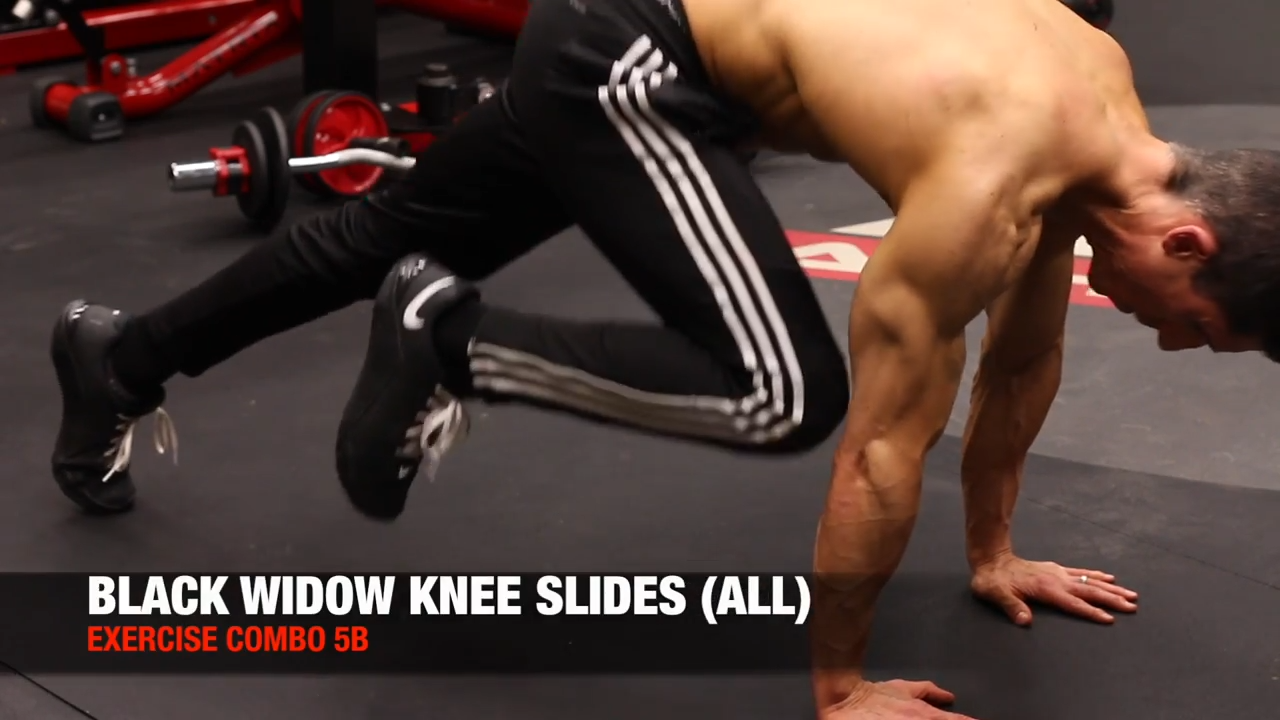
Exercise notes: Drive your knee in toward your elbow, and slide it up to get a bit more flexion through the spine, which engages both upper and lower abs.
For this next exercise, you’re basically doing the a crunch with an extra hold at the top, being sure to ‘levitate’ your scapula off the ground.
LEVITATION CRUNCH (ALL LEVELS)

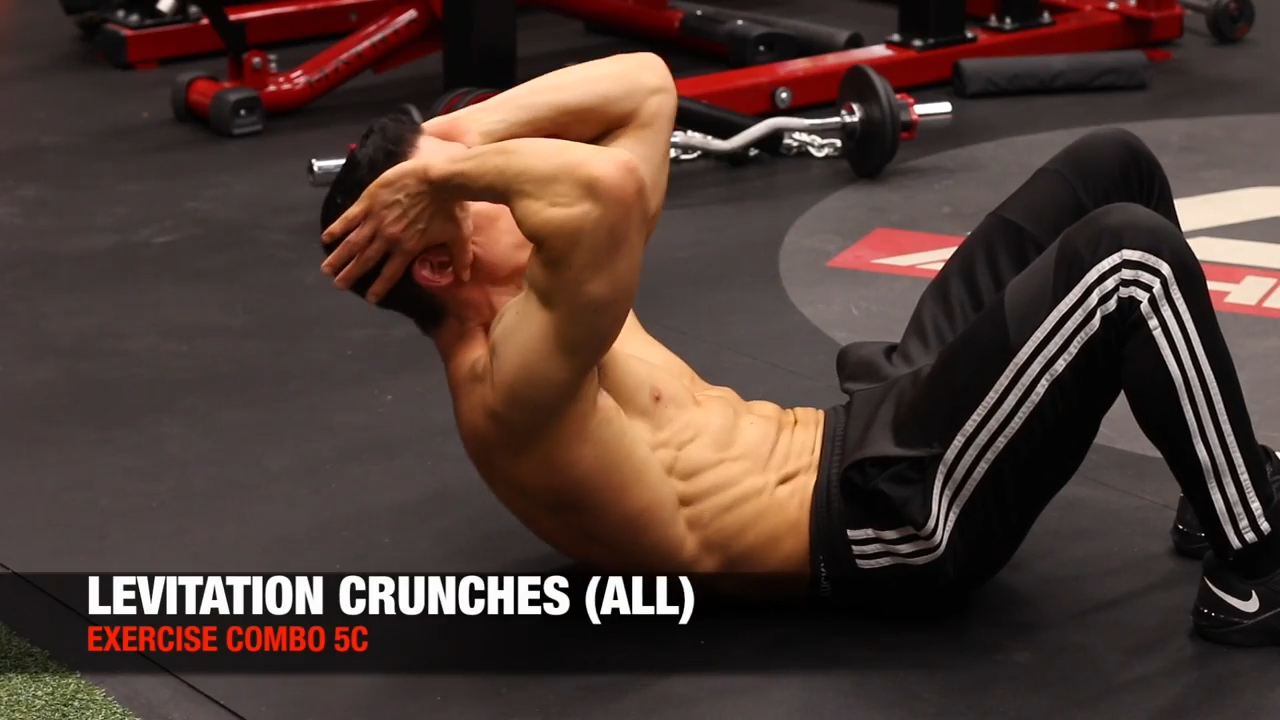
Exercise notes: The goal is to elevate your scapula and shoulder blades off the ground as if you’re levitating them. Don’t curl them up toward your knees.
CORRECTIVE
I believe corrective exercises should be part of every workout, so I’ve included them in these workouts just as I do in my ATHLEAN-X training programs.
This corrective exercise called the Angel and Devil seems so sweet and easy, but it is a killer for the entire posterior chain!
Lie face down on the floor and elevate arms and legs off the ground by engaging the back, glutes and hamstrings. Move the arms in an ‘angel’ fashion.
ANGEL AND DEVIL (ALL LEVELS)

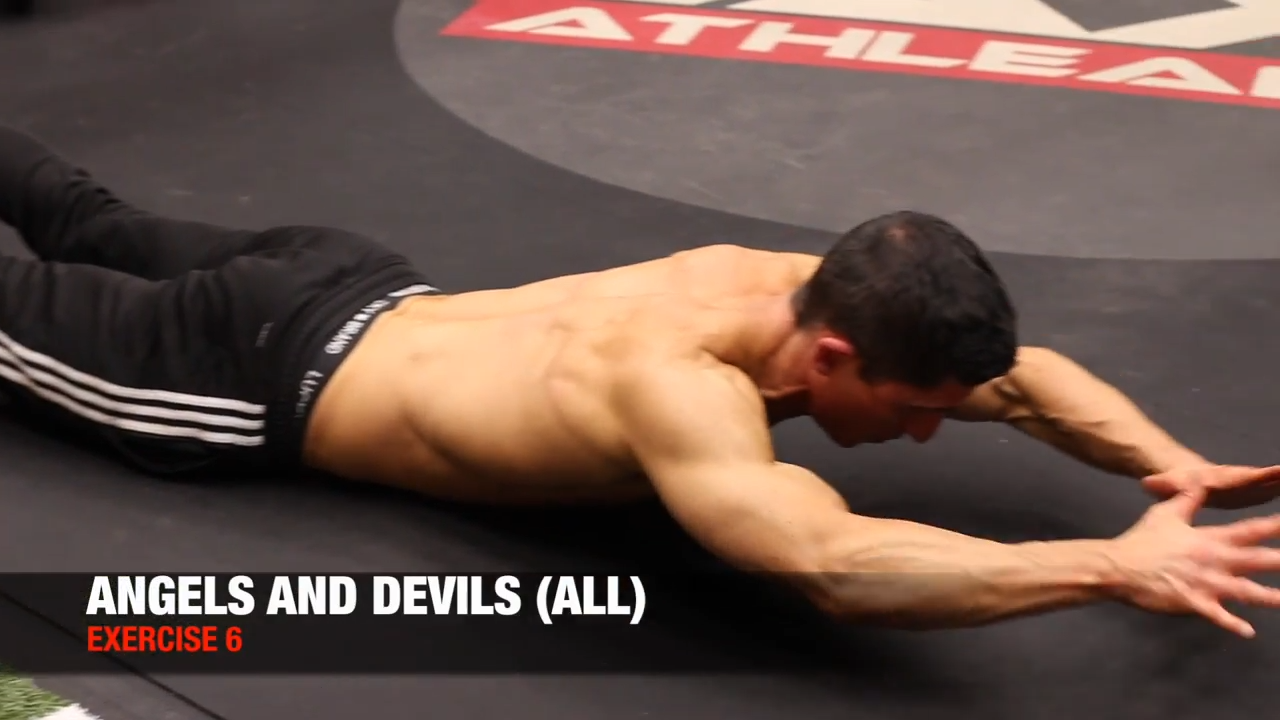
Exercise notes: Elevate your quads off the ground by engaging the glutes and low back. The rotation of the arms takes our shoulders through full rotation to work not only the rotator cuff but also the scapulae and mid back muscles. These are areas that tend to get neglected in our training.
BODYWEIGHT HOME WORKOUT B
Workout B is also comprised of the 6 major functions: Lower Body Anterior Chain, Upper Body Upper Push, Lower Body Posterior Chain, Upper Body Pull, Abdominal Circuit and Corrective Exercise.
Just as with Workout A, we’re shooting for one minute per exercise with no rest between exercises or between circuits. If you must rest/pause you can do so.
You’ll be alternating Workout B with Workout A on a Monday – Wednesday – Friday schedule.
LOWER BODY POSTERIOR CHAIN
In Workout B, we’ll be swapping in the lower body posterior chain series to start off the workout and hitting anterior chain later in the workout.
All of the exercises in this series are appropriate for beginners to advanced. For the first exercise you’ll need a slick floor surface and only socks on your feet.
SLICK FLOOR BRIDGE CURL (ALL LEVELS)

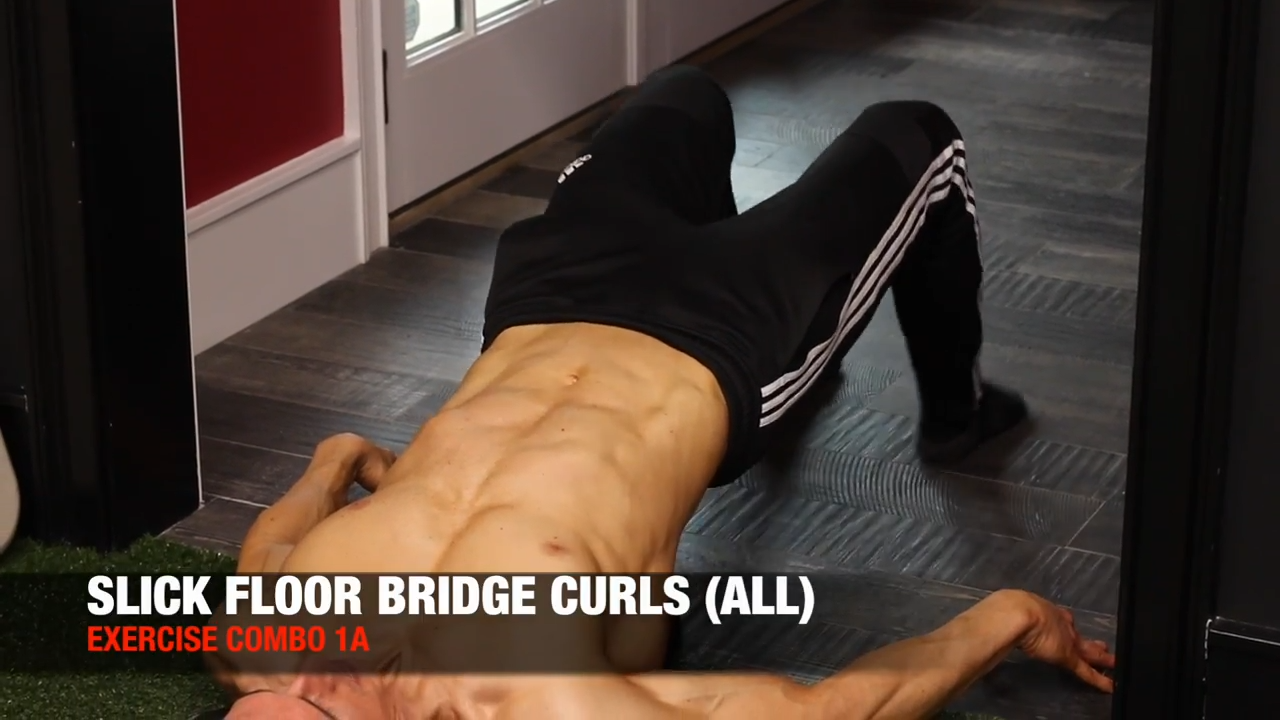
Exercise notes: Use socks on a slick surface like a hardwood or tile floor. The key in this exercise is learning how to engage both your hamstrings and your glutes together at the same time. You have to maintain the high bridge while you’re sliding your legs out and back into the hamstring curl, ensuring that your glutes are the primary driver of the movement.
LONG LEG MARCH (ALL LEVELS)

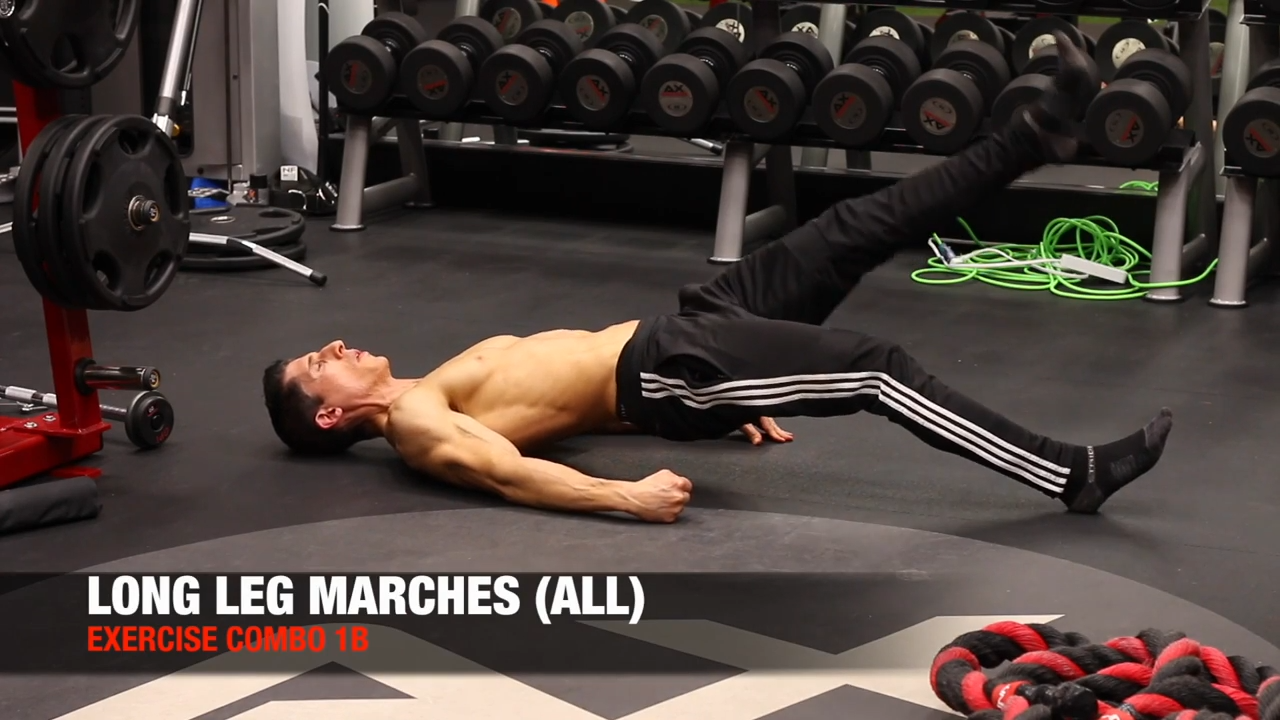
Exercise notes: Once again, we’re trying to work the entire posterior chain. This exercise looks so easy, but it will light up your glutes and legs more than you might have thought!
HIGH HIP BUCK (ALL LEVELS)

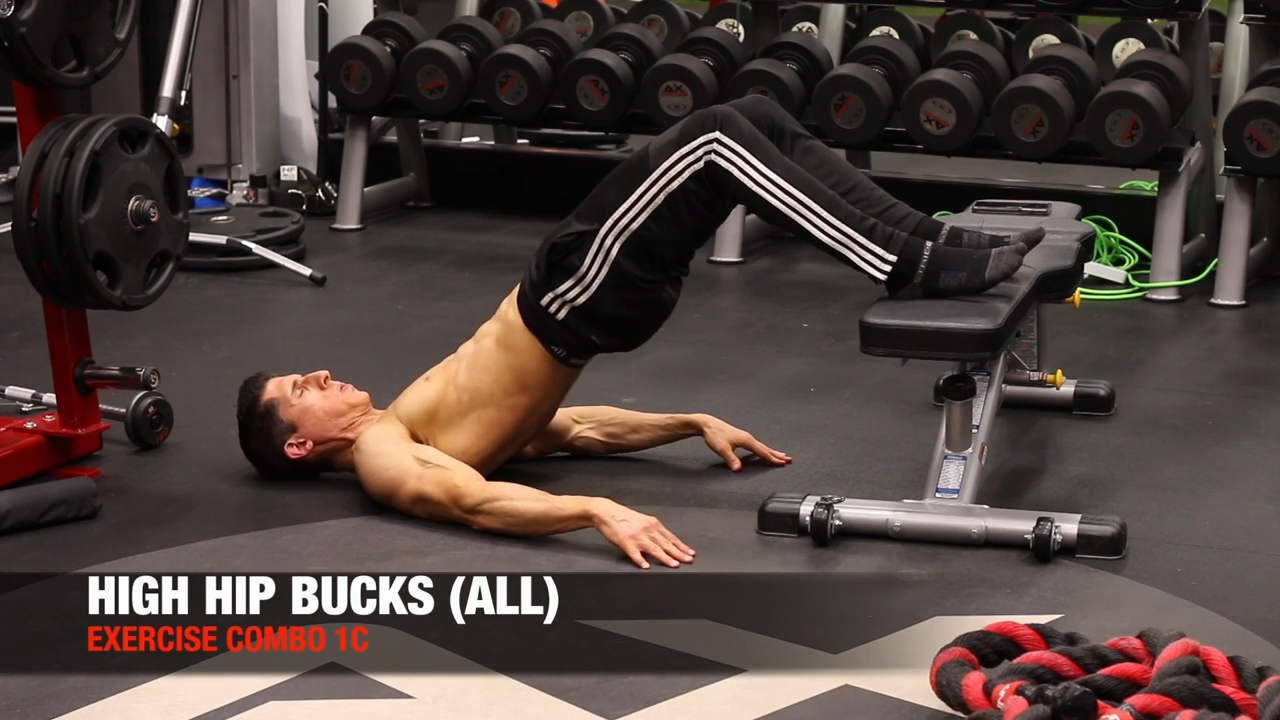
Exercise notes: This exercise might look simple, but the lack of rest and cumulative fatigue are going to start making a serious impact! Put your feet on any surface and allow the glutes to drive the movement.
UPPER BODY UPPER PUSH
In the upper push portion of Workout A, we went heavy on the front side of the shoulders, but in Workout B we’re going to go heavier on the chest.
We’re also going to be hitting the shoulders and triceps with some excellent bodyweight selections.
VARIABLE WALL PUSHUP (ADVANCED)

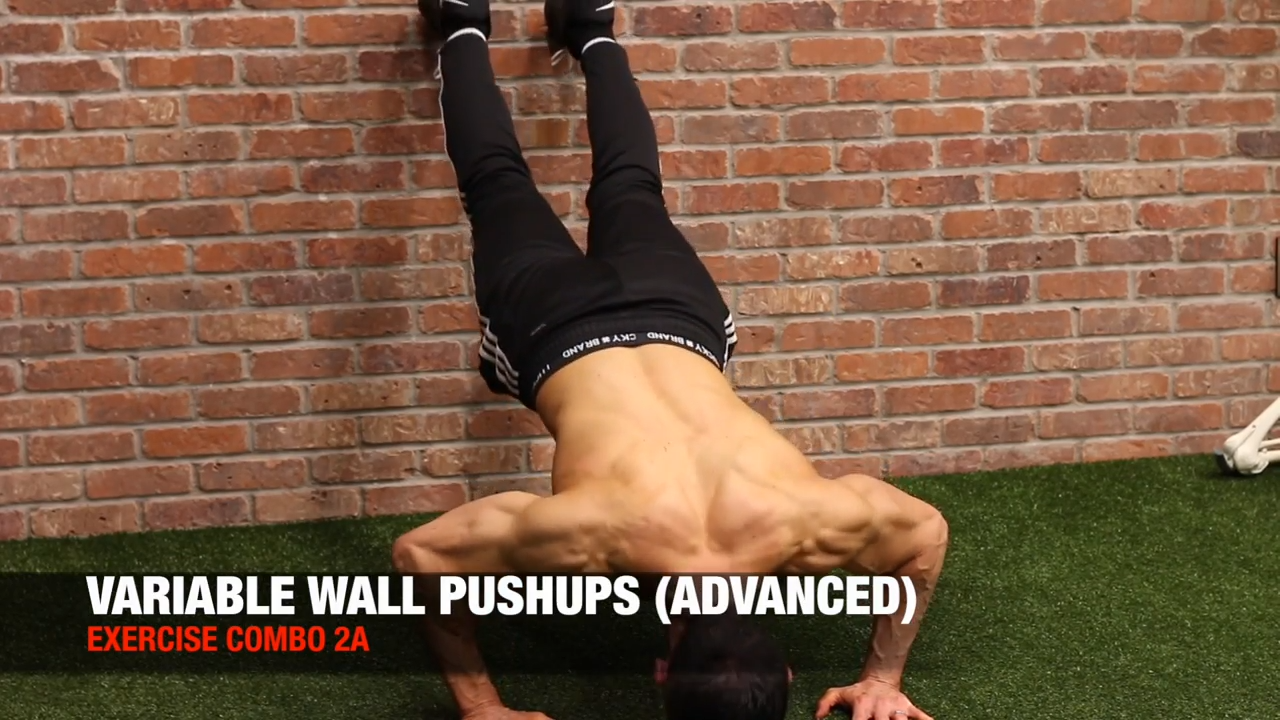
Exercise notes: Because we’re in the decline position on this exercise, we’re working the upper portion of the chest. As you fatigue, simply walk yourself down the wall to allow you to continue, knowing that the flat variation is going to be a little bit easier than the decline variation.
KNEE DECLINE TO FLAT PUSHUP (BEGINNER)

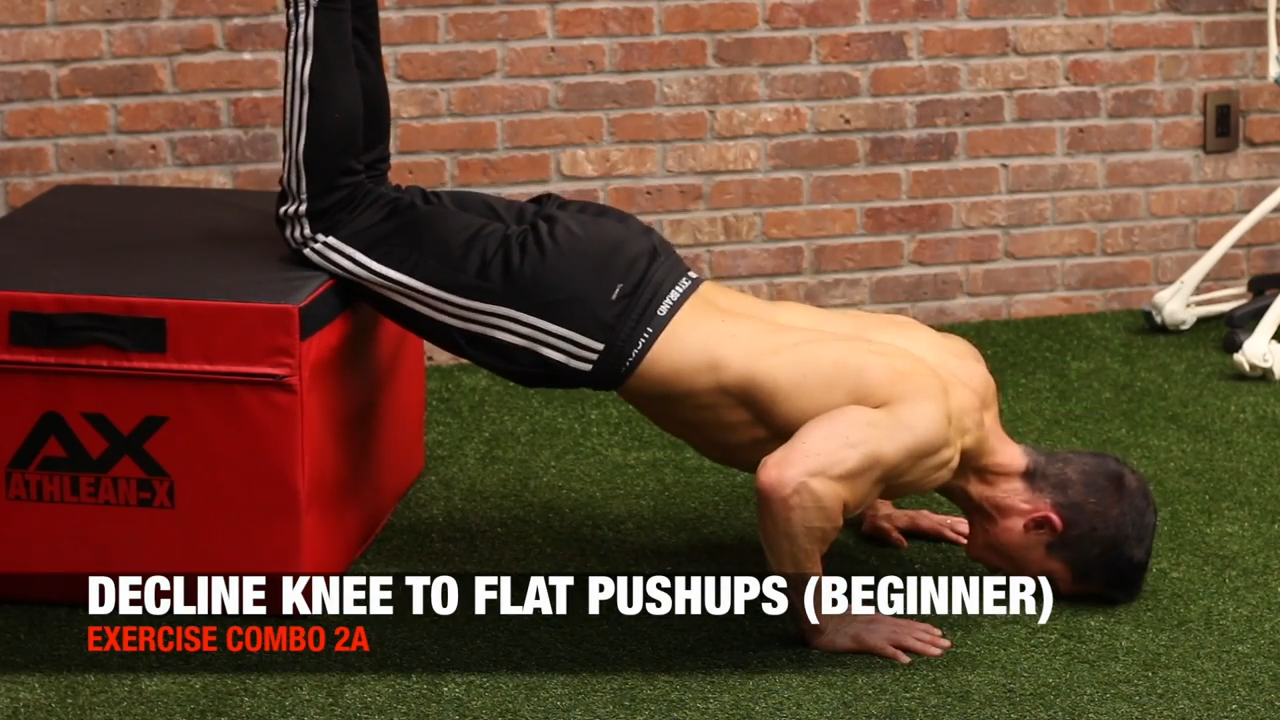
Exercise notes: If the wall version is too hard, you can simply put your knees up onto any surface (couch, bed, etc.) First perform the decline variation and when you can’t do anymore there, go down to the flat variation.
ALTERNATING BODYWEIGHT SIDE LATERAL RAISE (ADVANCED)

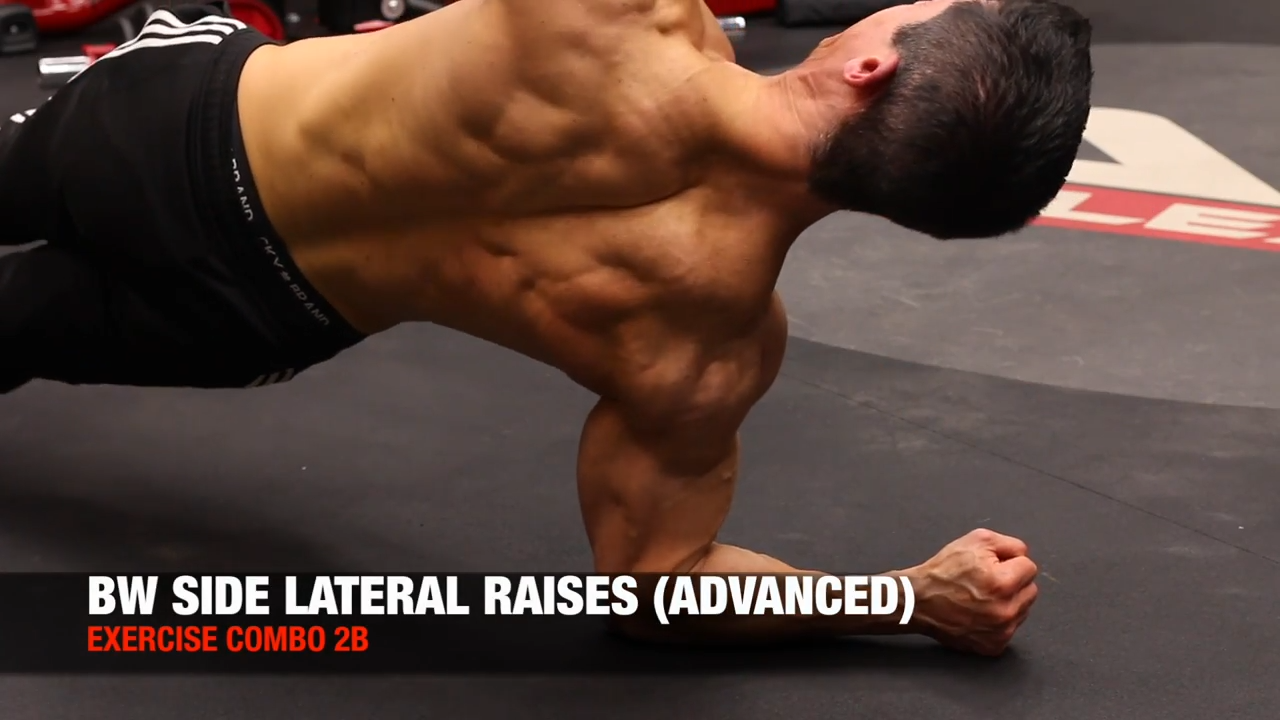
Exercise notes: We always think we have to move the limb in space to work a muscle, and that’s not true. In this exercise we’re moving the body around a fixed limb to get relative abduction of the arm. This means that we are training the shoulder by moving the body away from the arm.
KNEE BODYWEIGHT SIDE LATERAL RAISE (BEGINNER)

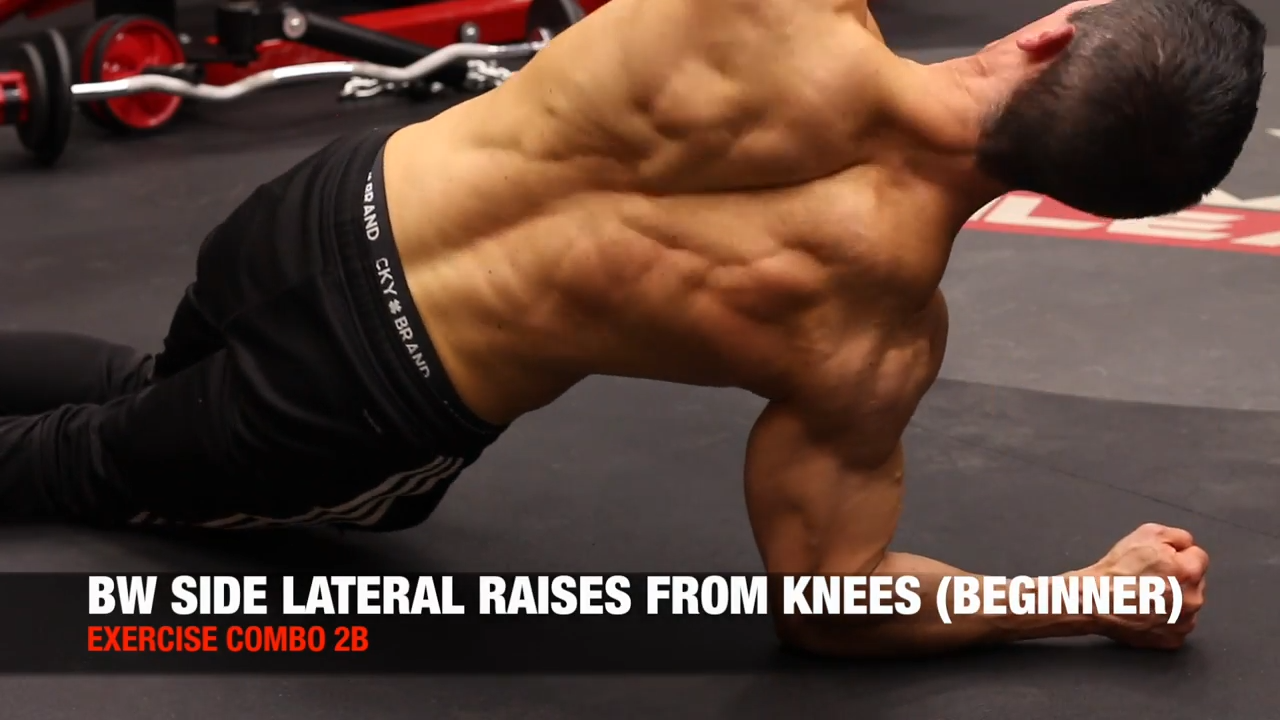
Exercise notes: Beginners can make this exercise easier by doing it from the knees.
BODYWEIGHT TRICEPS EXTENSION (ALL LEVELS)

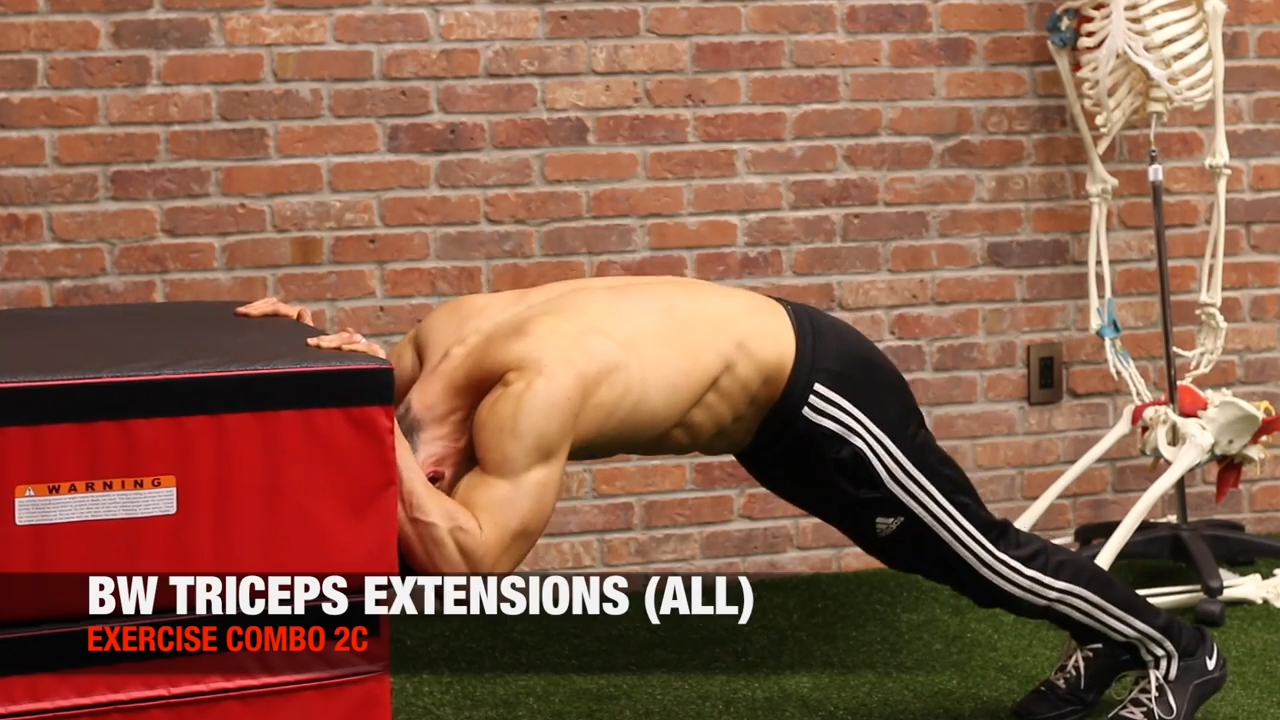
Exercise notes: This exercise will put the long head of the triceps on stretch. You can choose any surface that’s approximately the height you see in the image above. Allow yourself to dip down and dive your head down underneath so you can get more extension of the arms back up over head.
LOWER BODY ANTERIOR CHAIN
The lower body anterior chain exercises in Workout A were largely squat biased, but in Workout B we’re going to hit the quads in more lunge biased exercises.
We’ll be alternating legs in each of these exercises, which means we’re getting some single leg training done. Single leg training is an important part of any training plan because it helps avoid muscle imbalance.
ALTERNATING CROSSOVER STEP UP (ALL LEVELS)

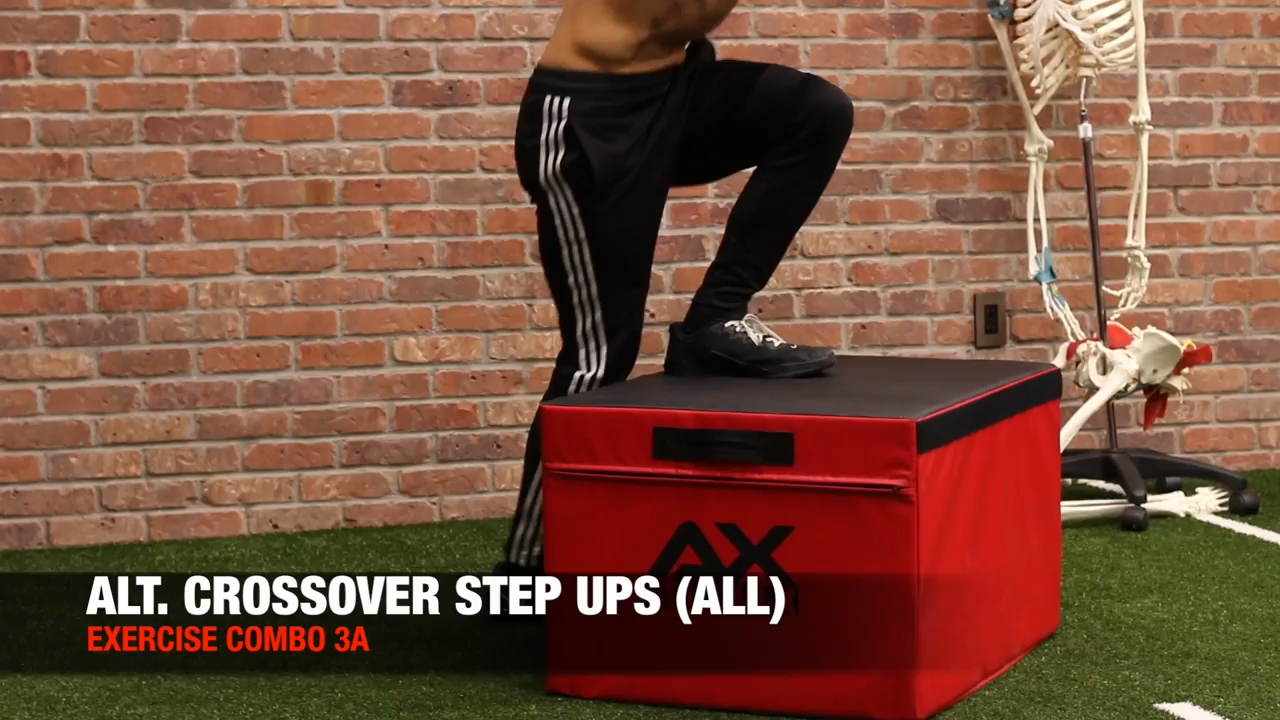
Exercise notes: Try to keep your torso upright as much as possible. The slight crossover of the leg behind you allows you to reload the quad more in the bottom position so you can drive up a bit more forcefully.
ALTERNATING REVERSE LUNGE (ALL LEVELS)

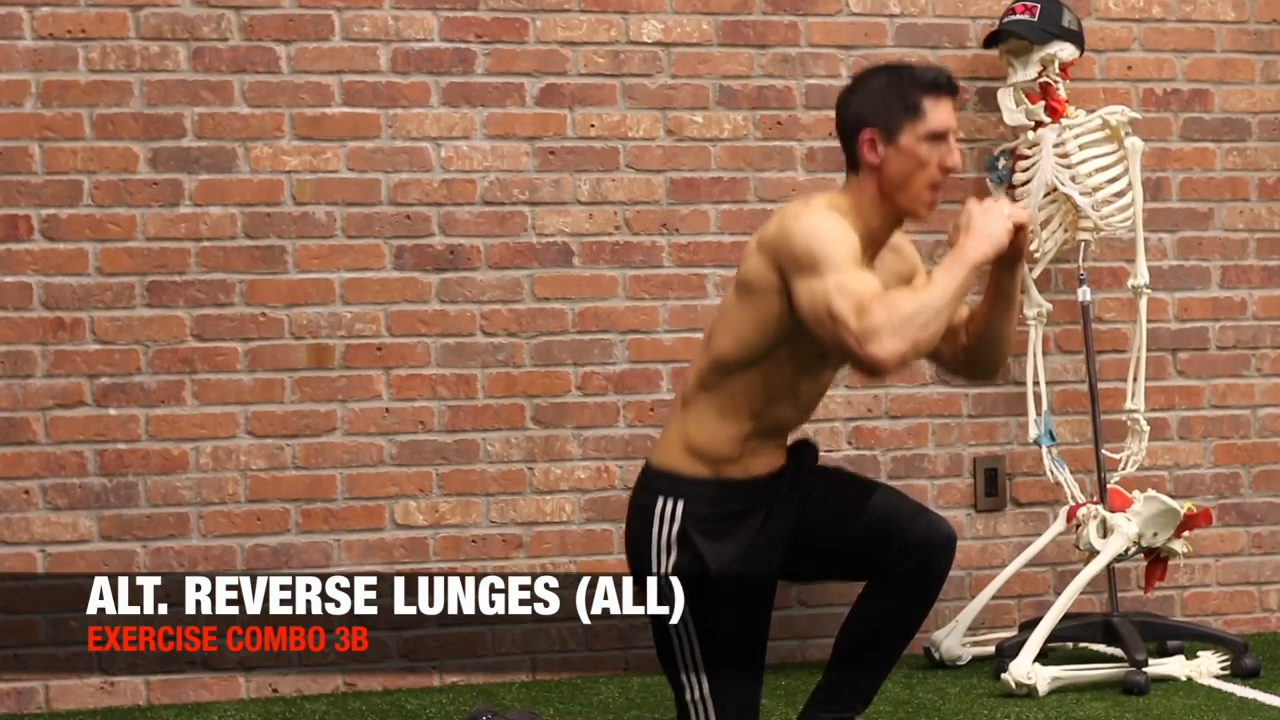
Exercise notes: This exercise is easier on the knees because we don’t get the interior stress that we get when we lunge forward. Even if you have knee problems, you’ll find that this exercise will work for you regardless of what level you’re performing it at.
SPLIT SQUAT JUMP (ALL LEVELS)

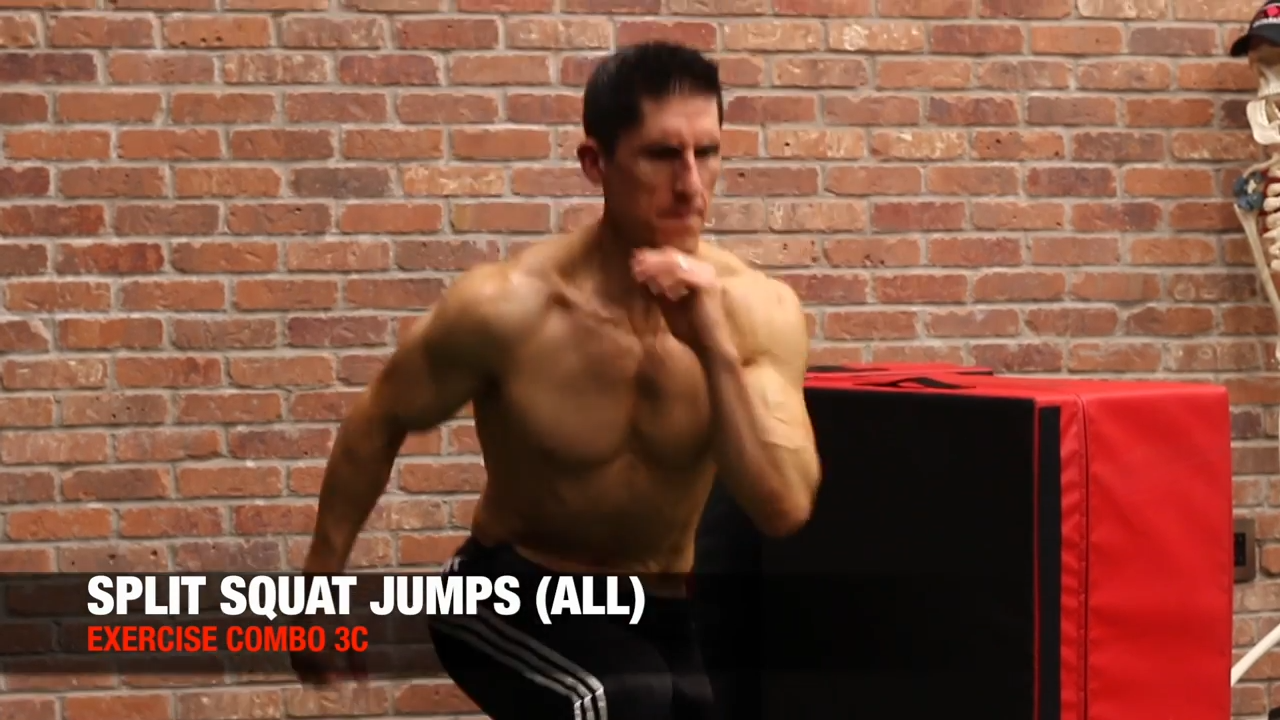
Exercise notes: This explosive exercise tends to be especially difficult at this point in the workout. See if you can gun it out for the entire minute if possible!
UPPER BODY UPPER PULL
Whereas in Workout A we started off the upper body pull circuit with a Pullup, for Workout B we’ll be kicking it off with a Chinup.
We’ll be hitting biceps and back with bodyweight and the same easy broomstick and chairs setup as we used in Workout A.
CHINUP (ADVANCED)

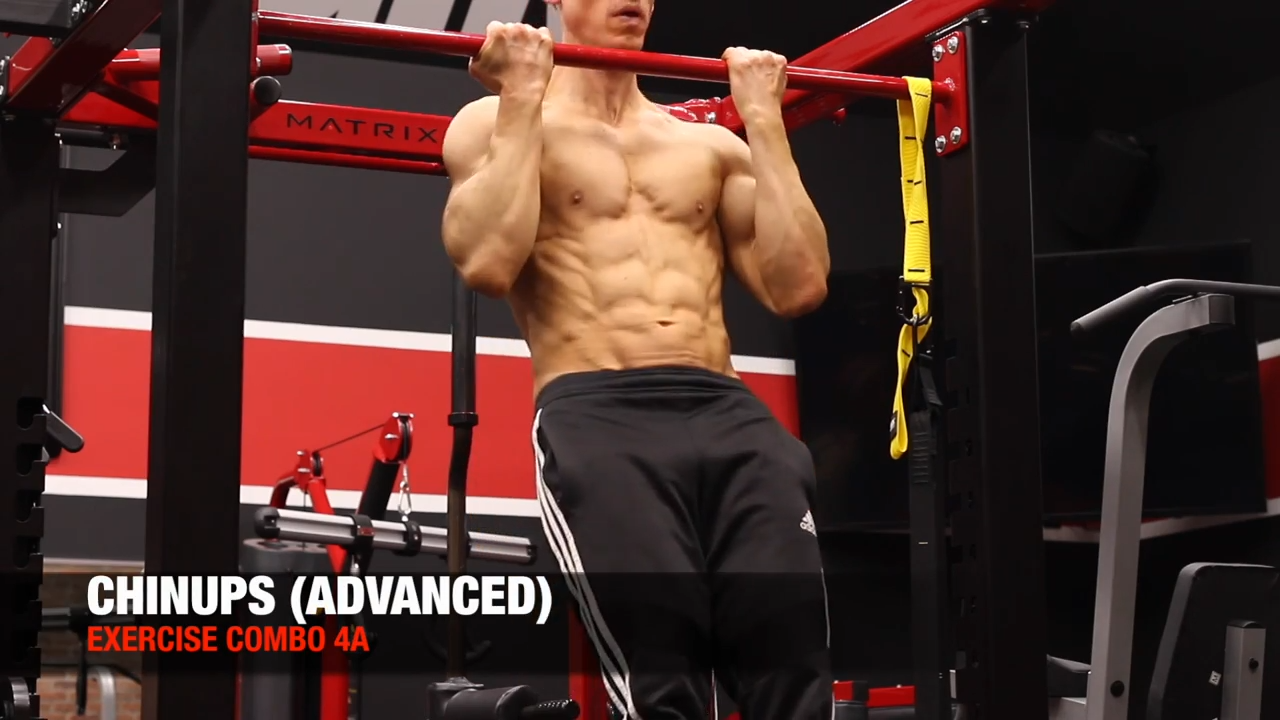
Exercise notes: The Chinup will help us focus more heavily on the biceps while still ensuring we’re getting all of the main benefits of one of the best exercises we can do for pull.
SEATED CHINUP (BEGINNER)

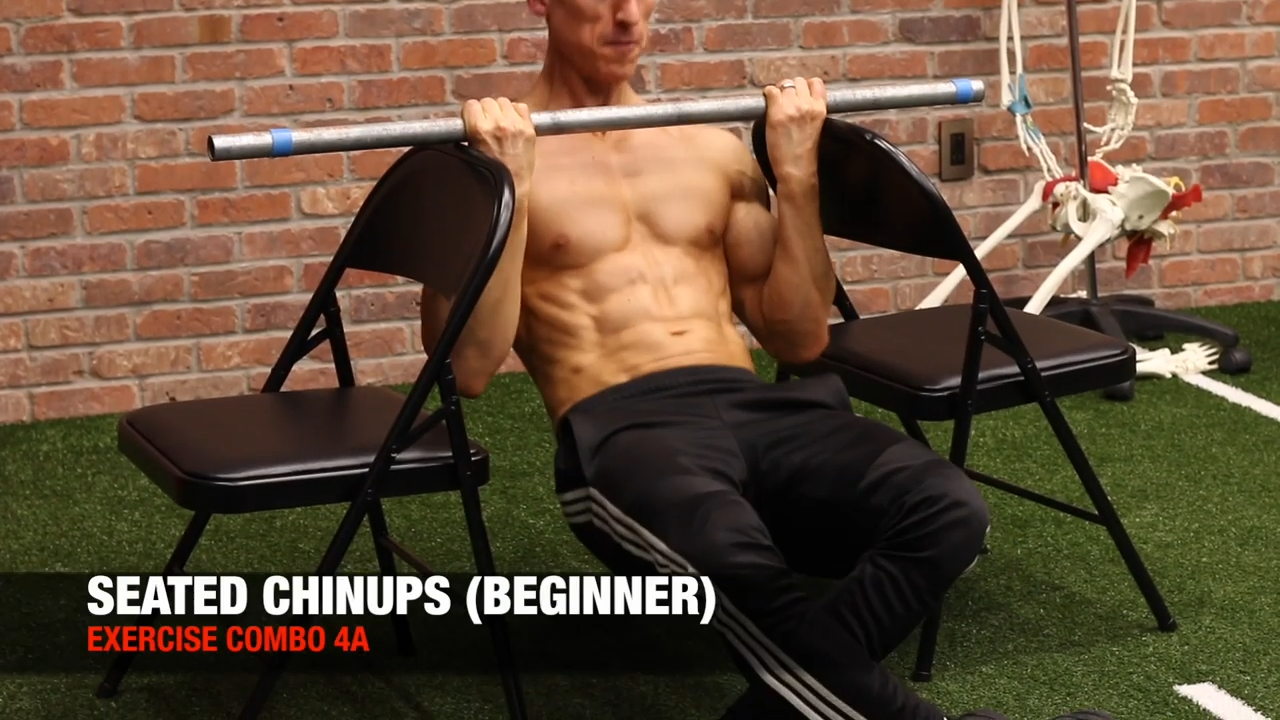
Exercise notes: If you can’t do a regular chinup, you can do the seated version using the same broomstick and chairs setup we used for the Seated Pullup in Workout A.
INVERTED ROW (ALL LEVELS)

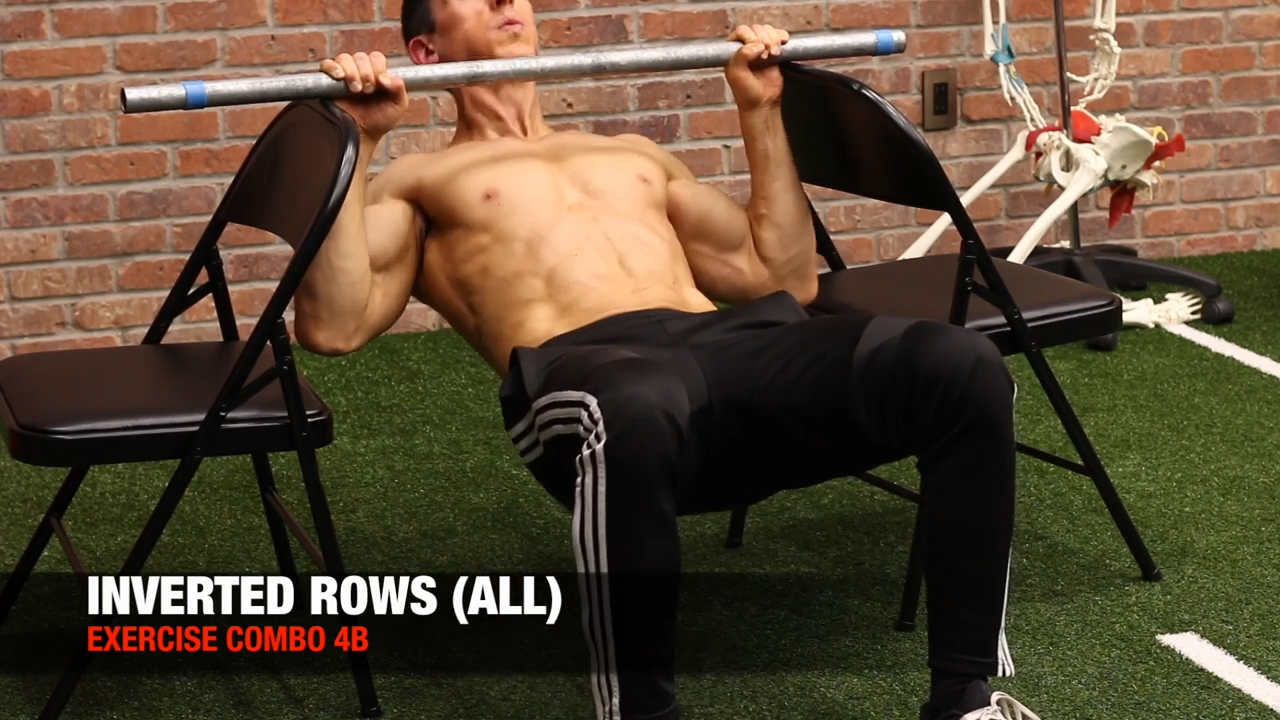
Exercise notes: This exercise helps us get more of a horizontal pull as opposed to a vertical one. At this point in the workout, this will feel more challenging than it might if you try it on its own.
BACK WIDOW (ALL LEVELS)

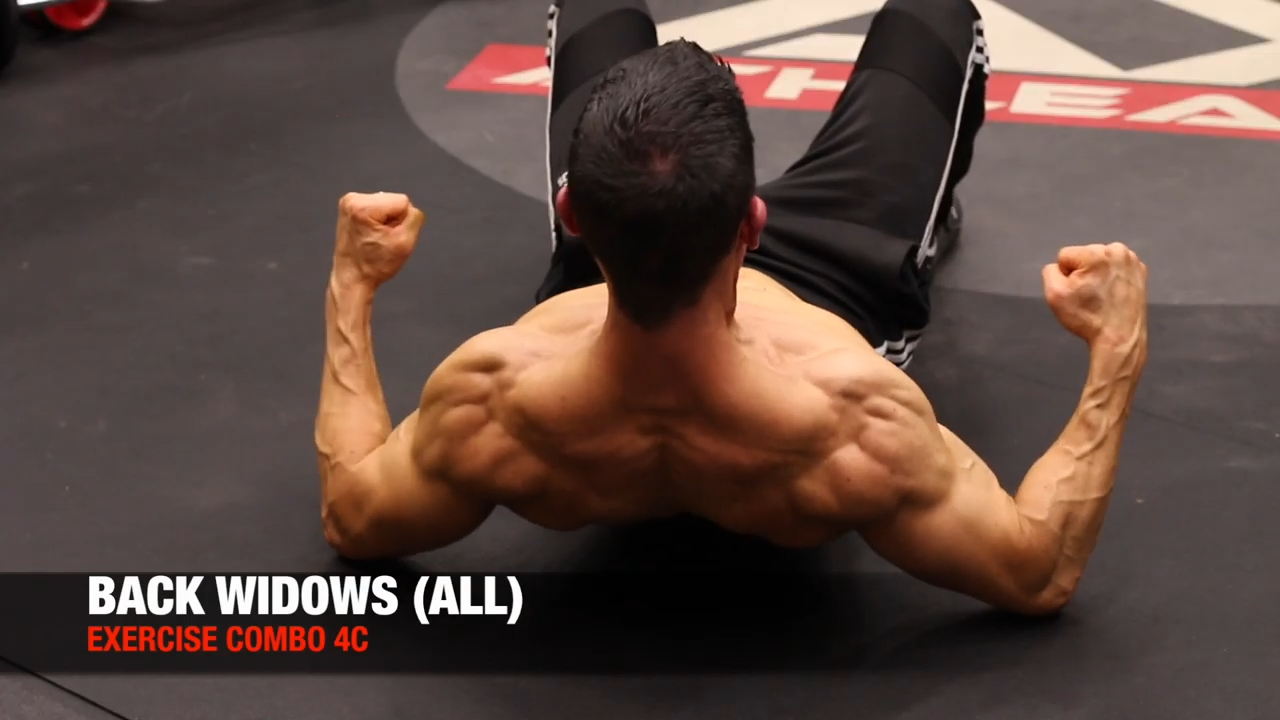
Exercise notes: Every single muscle in the upper back and rear delt are engaged in this simple looking exercise.
CORE CIRCUIT
Just as we did in Workout A, we’re going to be starting out with lower ab focus, moving on to a mid-range exercise and finishing off with an upper ab move that also includes some obliques.
It’s all part of that Six Pack Progression I prescribe for abs, which is the most effective order in which to work the core muscles!
AB HALO (ALL LEVELS)

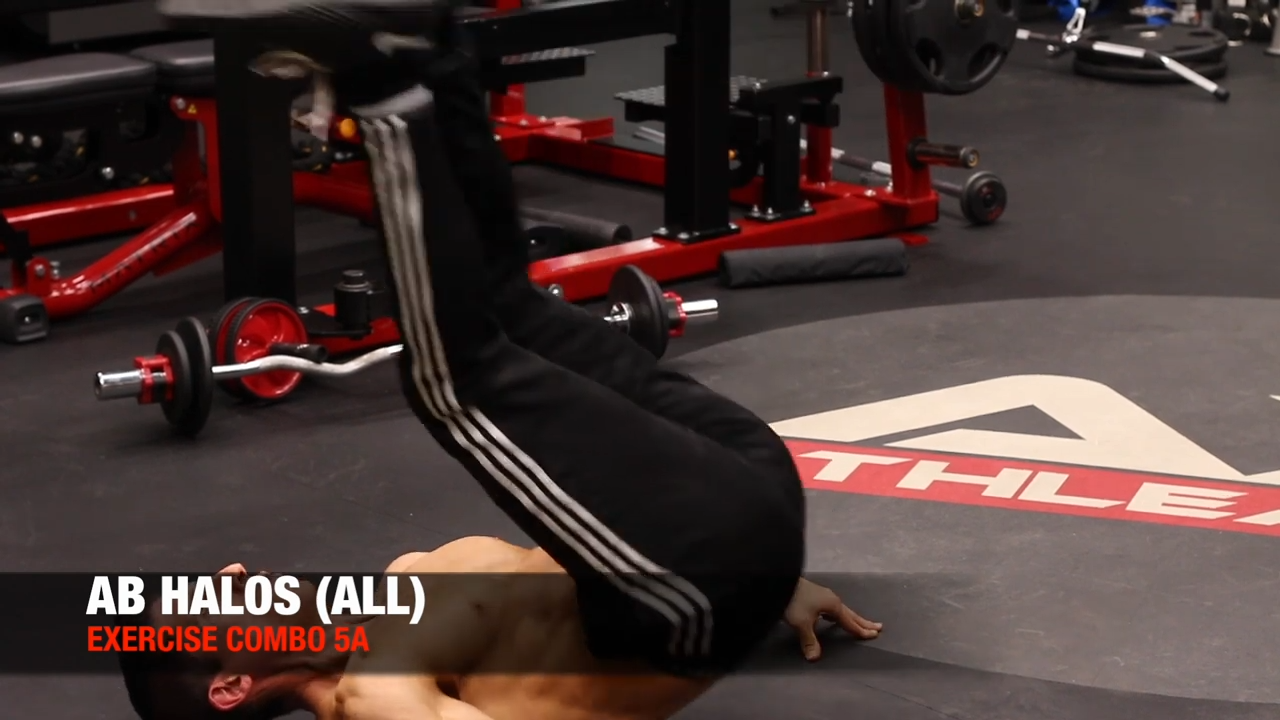
Exercise notes: Lift the pelvis off the ground, engage the lower abs and try to create a half circle for a little bit of rotation. Repeat for the entire minute.
V-UP TUCK (ALL LEVELS)

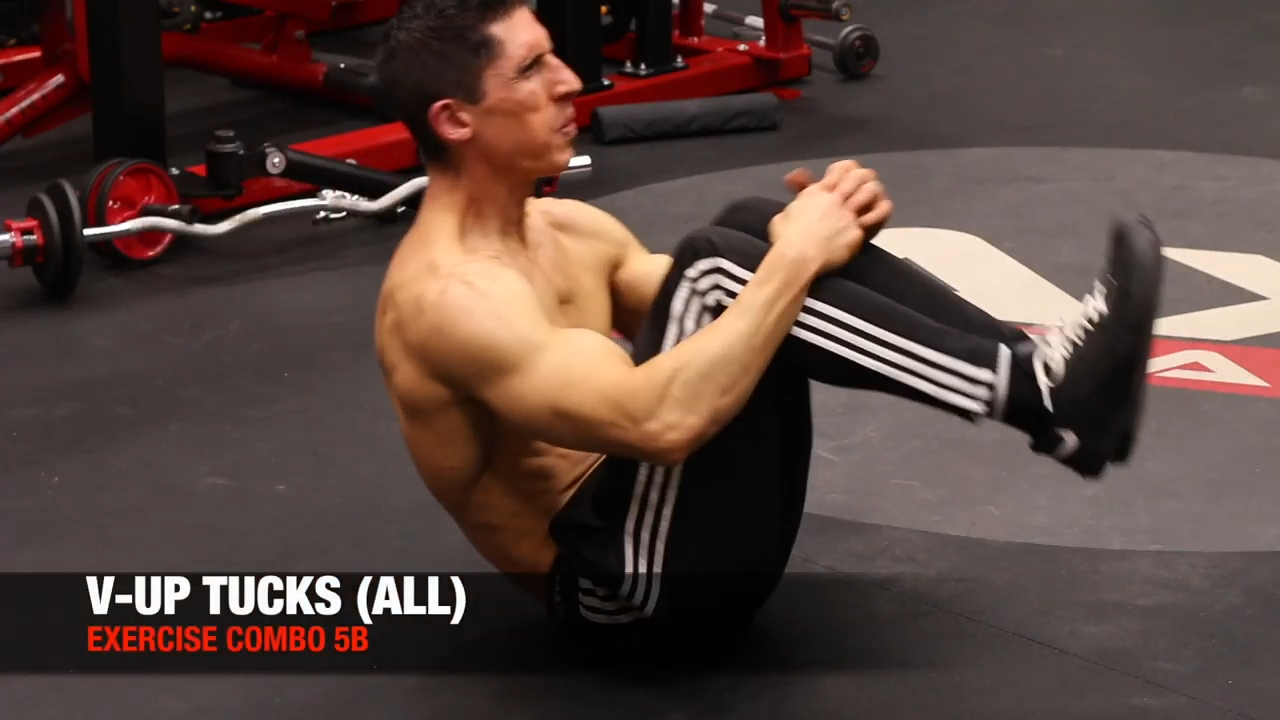
Exercise notes: Here we’re trying to engage both upper and lower abs by moving both the upper and lower torso together.
SIT UP ELBOW THRUST (ALL LEVELS)

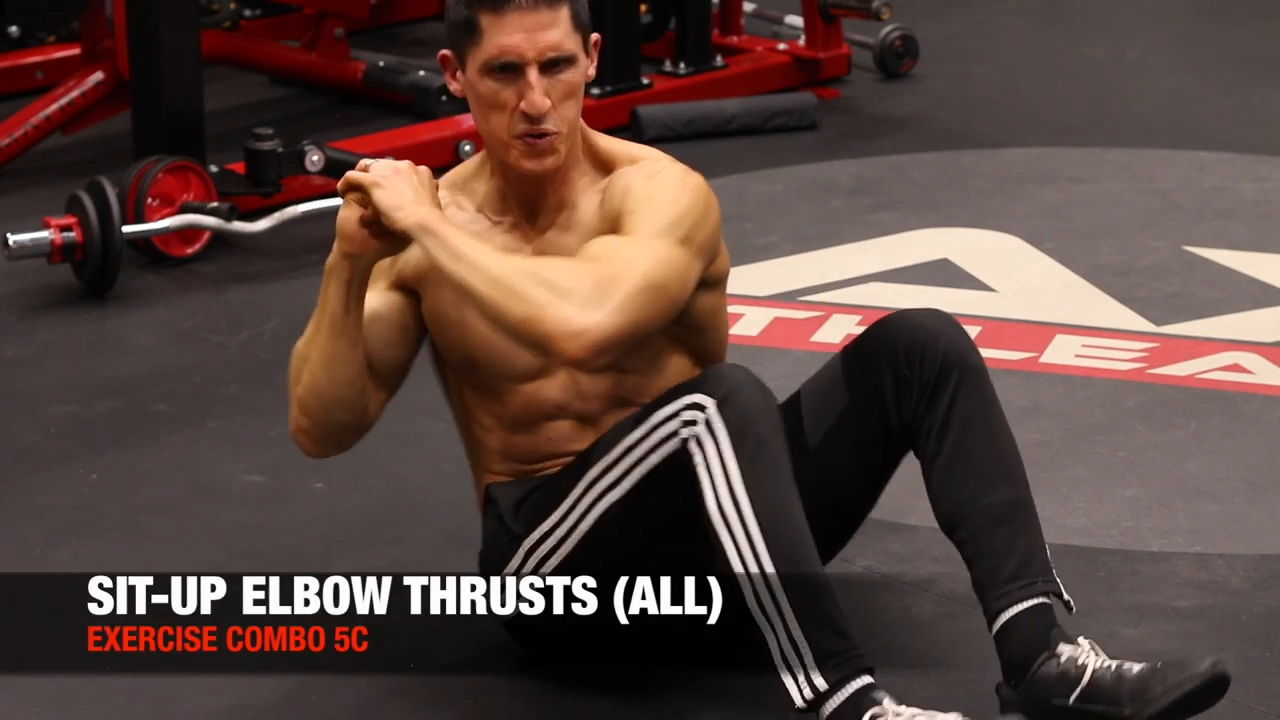
Exercise notes: This is primarily a top down driven exercise with a little bit of extra oblique work.
CORRECTIVE
The final exercise in Workout B is of course a corrective, and it’s one of my favorites.
It incorporates low back and glutes which are two commonly weak muscle groups that prefer to work together.
REVERSE HYPEREXTENSION (ALL LEVELS)

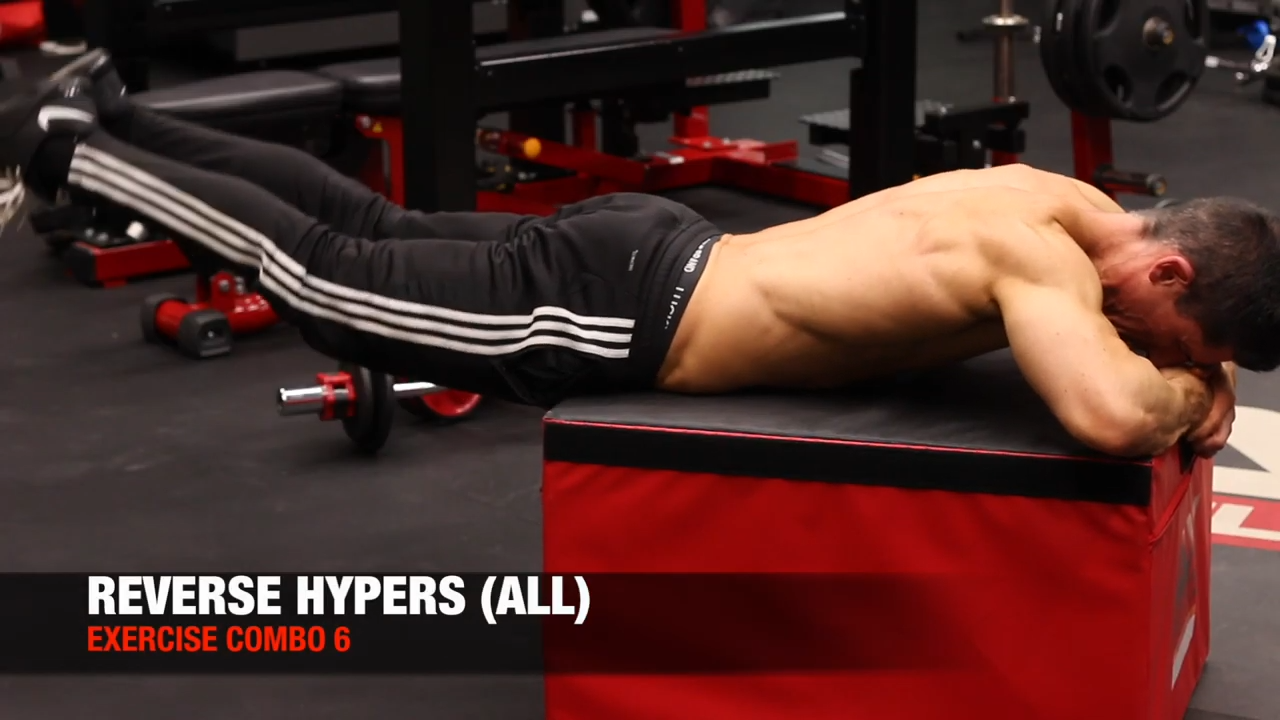
Exercise notes: Lay face down over any stable surface and drive the lifting of the leg by first contracting the glutes and then allowing the low back to take over from there.
As you can see, it’s entirely possible to get a complete total body workout even if you have no workout equipment at all. If you’re stuck without access to the gym for a month at a time, this complete bodyweight training routine will help make sure you don’t have to leave the gains behind!
Looking for a program to help you burn fat and pack on ripped muscle with bodyweight exercises while training at home, we’ve got you covered with our ATHLEAN-X Programs!
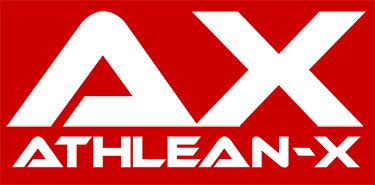
- It is totally possible to get a complete total body workout at home with no equipment. Since some people might not have access to a gym, I’ve created not just one home workout, but a complete month long bodyweight routine you can do at home.
- This one-month routine is comprised of two home workouts without equipment to build muscle, each of which have options for beginners and advanced.
- Each of the workouts will focus on 6 major functions: Lower Body Anterior Chain, Upper Body Upper Push, Lower Body Posterior Chain, Upper Body Pull, Abdominal Circuit, and a Corrective Exercise.
- You’ll alternate through these workouts on a Monday – Wednesday – Friday schedule, making sure to challenge yourself with the more difficult variations as you get stronger.
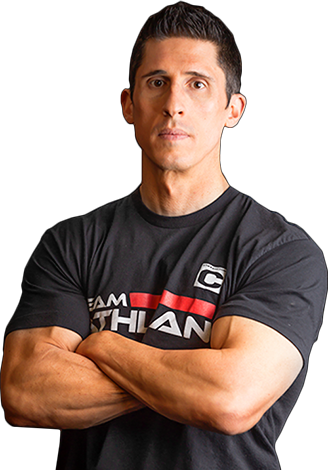
Jeff Cavaliere M.S.P.T, CSCS
Jeff Cavaliere is a Physical Therapist, Strength Coach and creator of the ATHLEAN-X Training Programs and ATHLEAN-Rx Supplements. He has a Masters in Physical Therapy (MSPT) and has worked as Head Physical Therapist for the New York Mets, as well as training many elite professional athletes in Major League Baseball, NFL, MMA and professional wrestling. His programs produce “next level” achievements in muscle size, strength and performance for professional athletes and anyone looking to build a muscular athletic physique.
